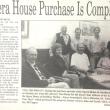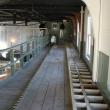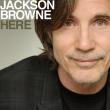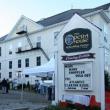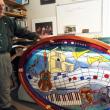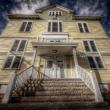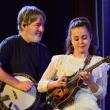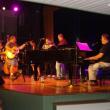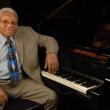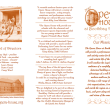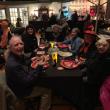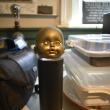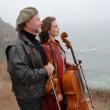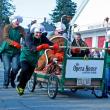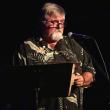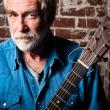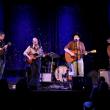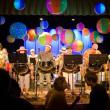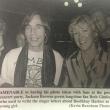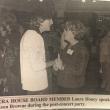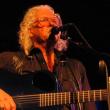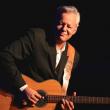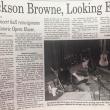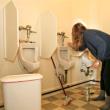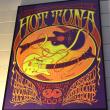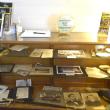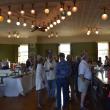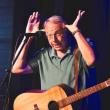20 years later: The beloved, iconic performance space keeps on a-rockin’
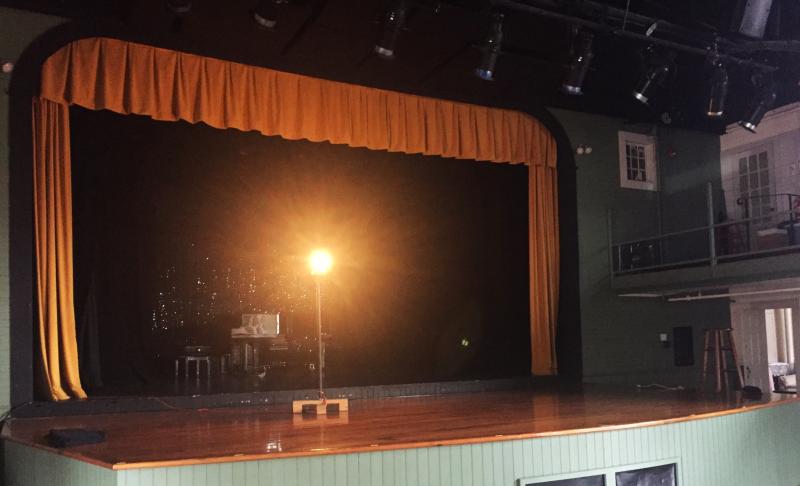 A ghost light has shone on the stage of the saved Opera House at Boothbay Harbor since 2004. File photo
A ghost light has shone on the stage of the saved Opera House at Boothbay Harbor since 2004. File photo
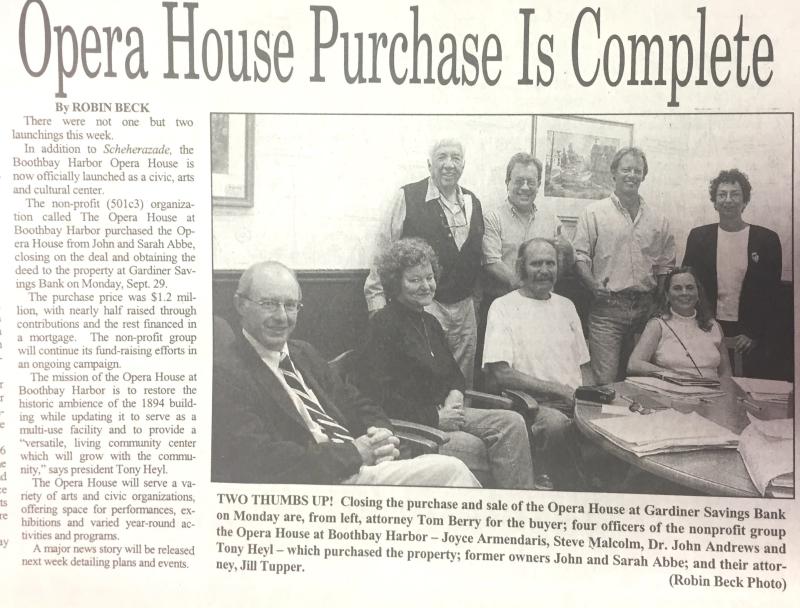 Opera House purchase announcement, September 2003. File photo
Opera House purchase announcement, September 2003. File photo
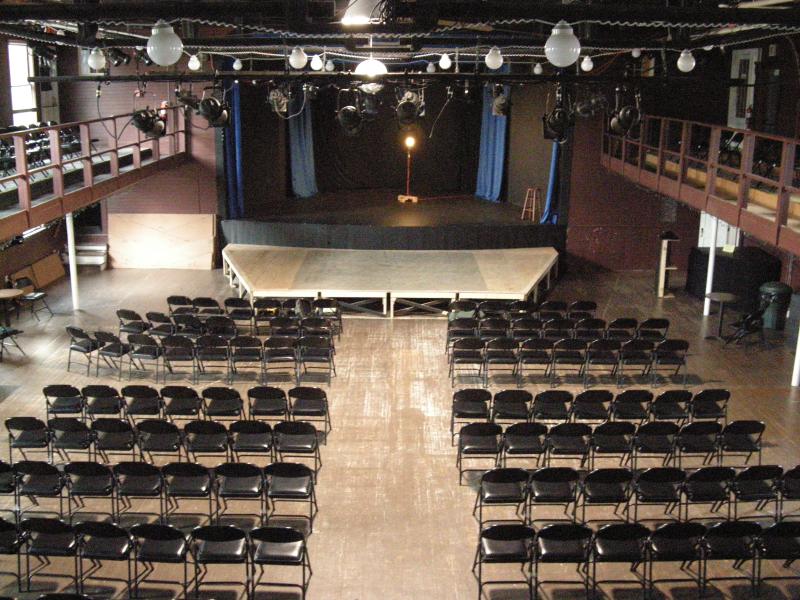 Old interior. File photo
Old interior. File photo
 The performance hall pre-restoration. File photo
The performance hall pre-restoration. File photo
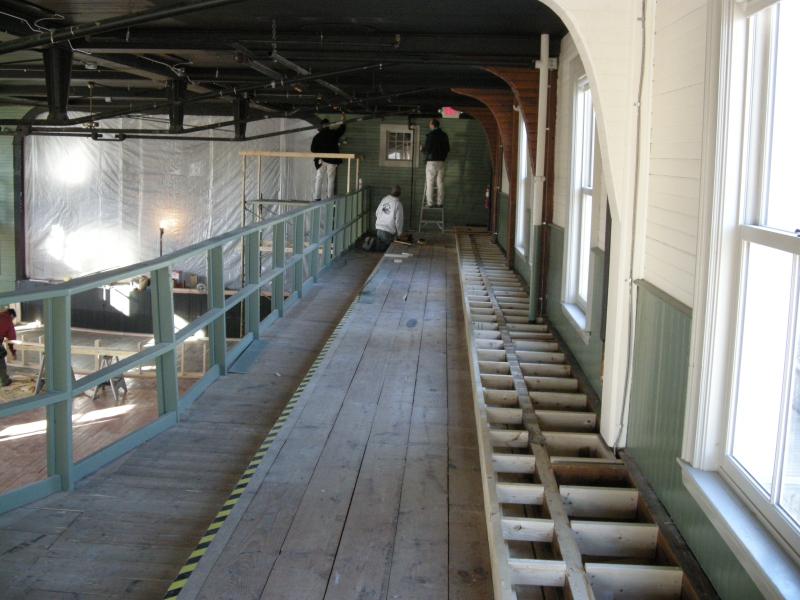 2008 balcony re-do. File photo
2008 balcony re-do. File photo
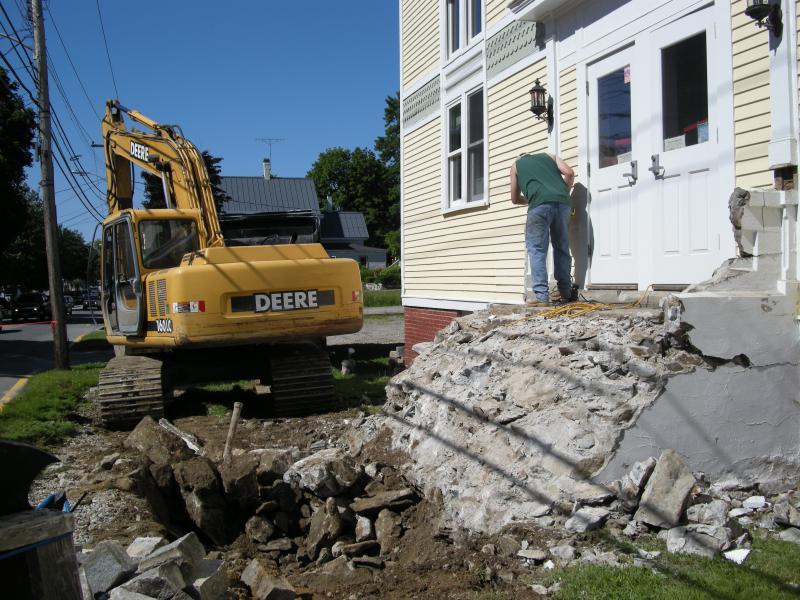 Demo outside the House’s Townsend Avenue-facing entrance. File photo
Demo outside the House’s Townsend Avenue-facing entrance. File photo
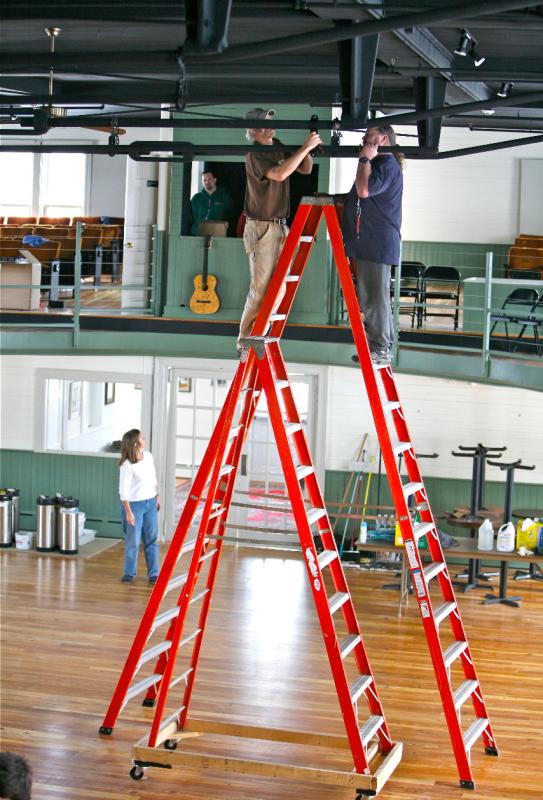 Steve Malcom and Mark Stover hang lights for the 2003 Jackson Browne benefit concert. Cathy Sherrill supervises from below. File photo
Steve Malcom and Mark Stover hang lights for the 2003 Jackson Browne benefit concert. Cathy Sherrill supervises from below. File photo
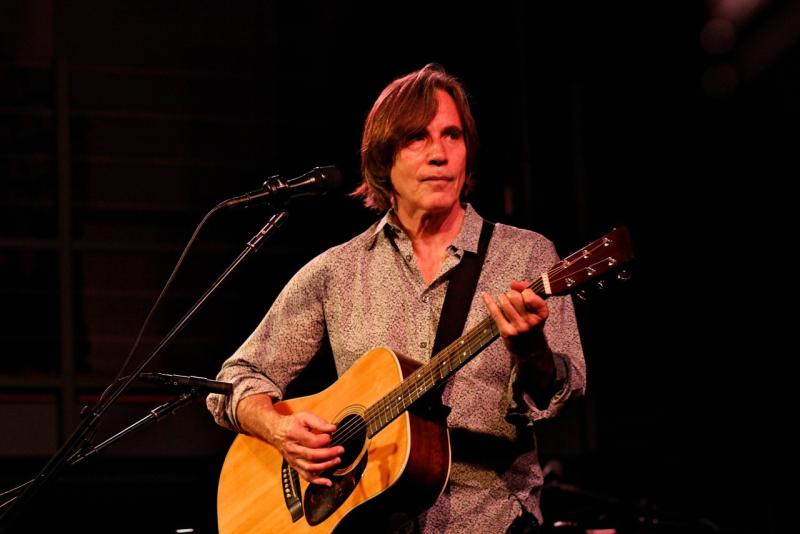 Jackson Browne’s November 2003 benefit concert. Robert Mitchell photo
Jackson Browne’s November 2003 benefit concert. Robert Mitchell photo
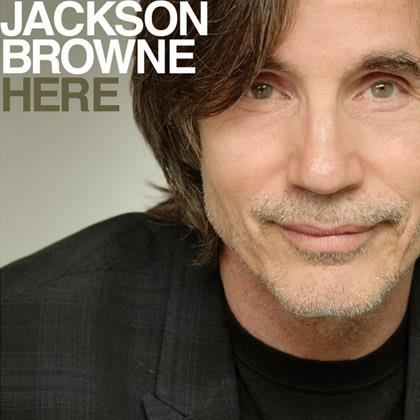 Opera House poster for Jackson Browne’s second show for the 10th anniversary. Courtesy of the Opera House at Boothbay Harbor
Opera House poster for Jackson Browne’s second show for the 10th anniversary. Courtesy of the Opera House at Boothbay Harbor
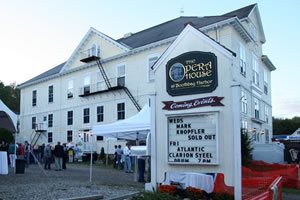 Mark Knopfler billboard 2006. Courtesy of the Opera House at Boothbay Harbor
Mark Knopfler billboard 2006. Courtesy of the Opera House at Boothbay Harbor
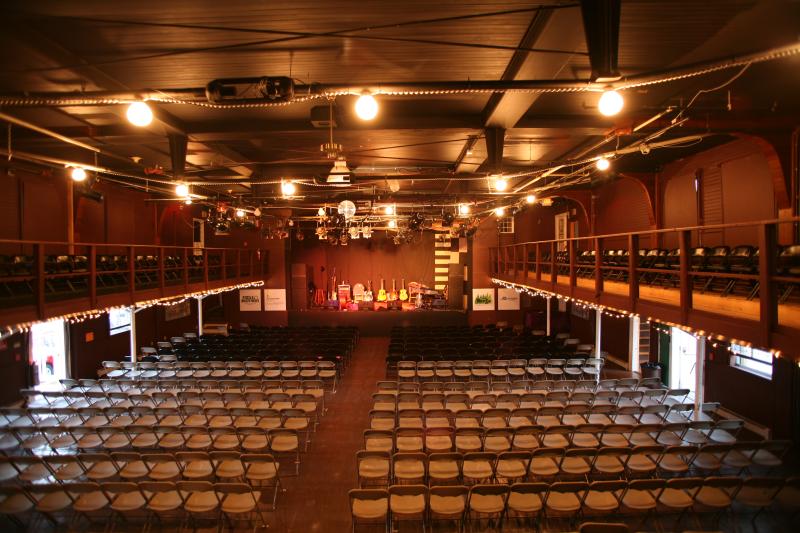 Setting the stage for Mark Knopfler. Courtesy of the Opera House at Boothbay Harbor
Setting the stage for Mark Knopfler. Courtesy of the Opera House at Boothbay Harbor
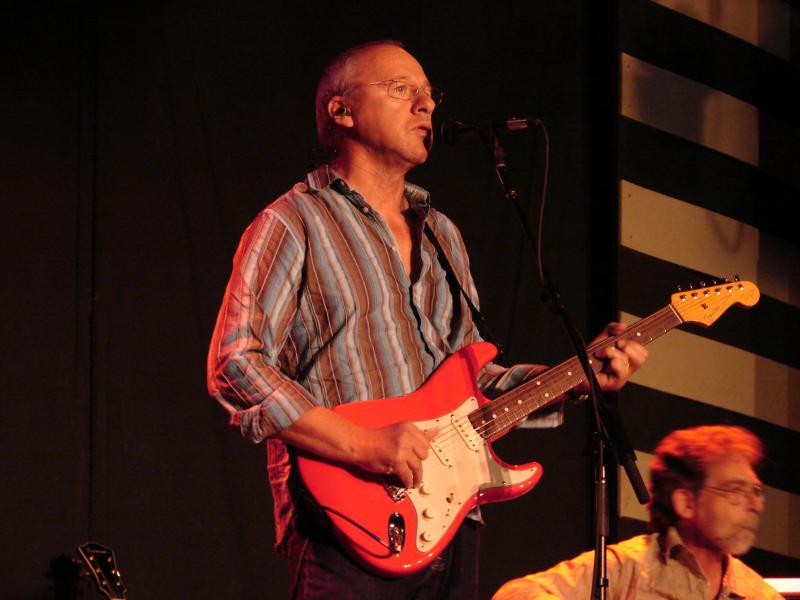 Mark Knopfler performs a benefit concert for the Opera House at Boothbay Harbor. File photo
Mark Knopfler performs a benefit concert for the Opera House at Boothbay Harbor. File photo
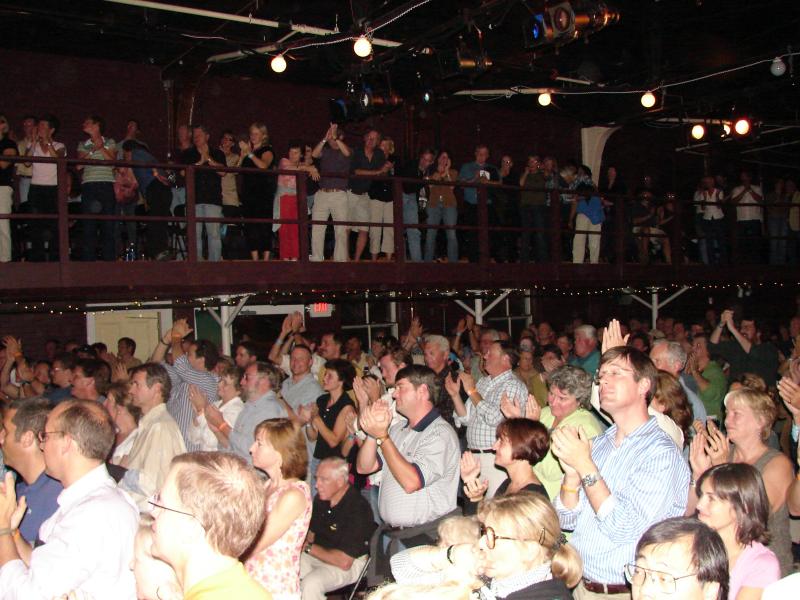 Audience at Knopfler concert. File photo
Audience at Knopfler concert. File photo
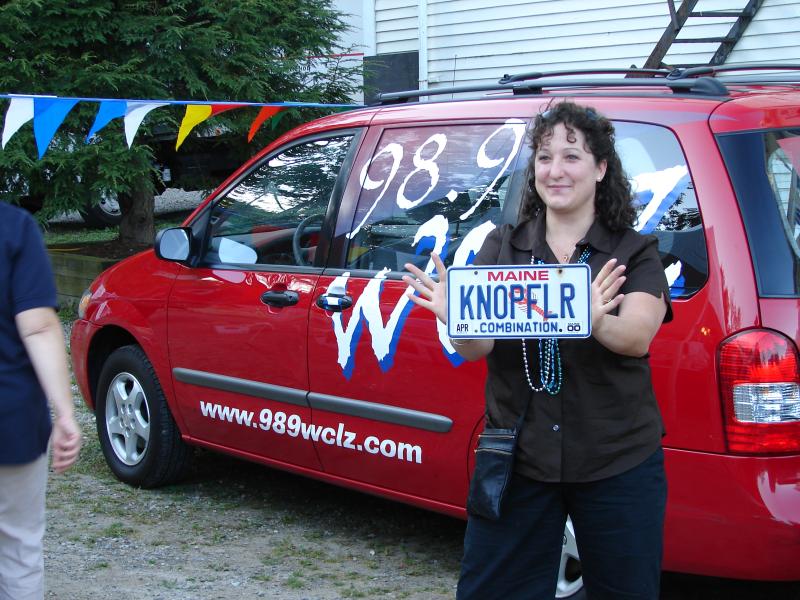 Big fan at the Opera House benefit. File photo
Big fan at the Opera House benefit. File photo
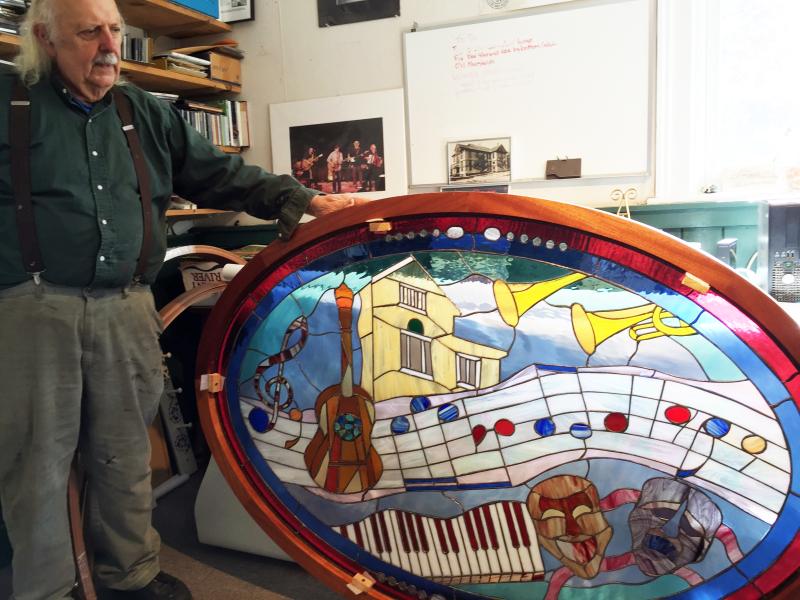 Master stained glass artist Dick Macdonald designed and made the new oval window. File photo
Master stained glass artist Dick Macdonald designed and made the new oval window. File photo
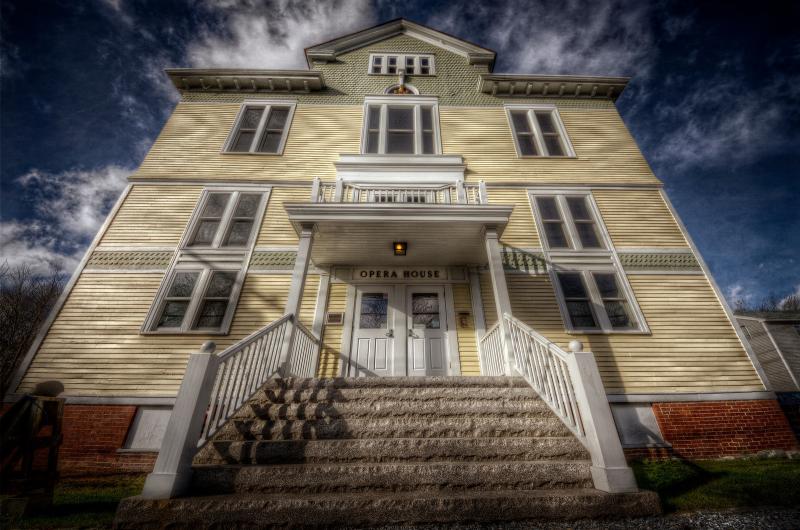 The Opera House at Boothbay Harbor was the image for April 2014 in a Haunted New England calendar created by Ghost Adventures paranormal researcher Jeff Belanger. Frank Grace photo
The Opera House at Boothbay Harbor was the image for April 2014 in a Haunted New England calendar created by Ghost Adventures paranormal researcher Jeff Belanger. Frank Grace photo
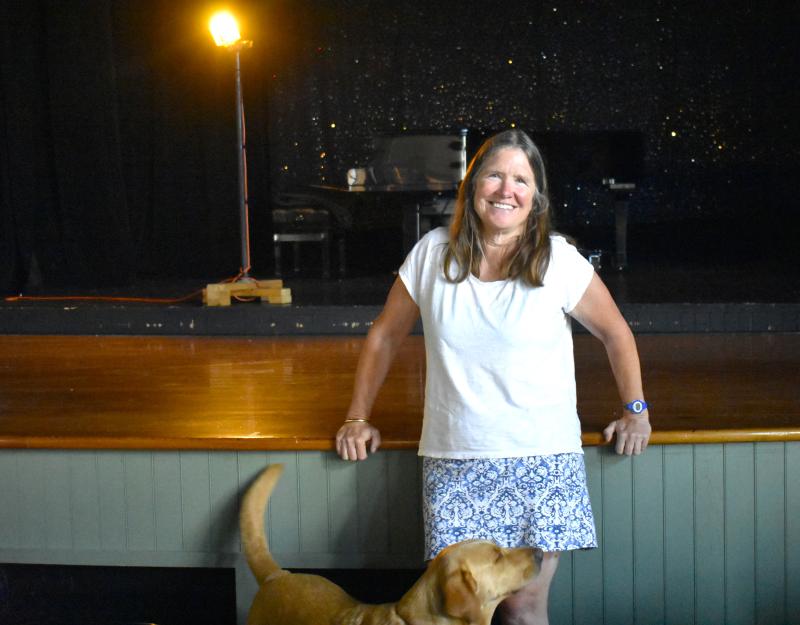 Cathy Sherrill, The Opera House at Boothbay Harbor’s executive director for 17 years. LISA KRISTOFF/Boothbay Register
Cathy Sherrill, The Opera House at Boothbay Harbor’s executive director for 17 years. LISA KRISTOFF/Boothbay Register
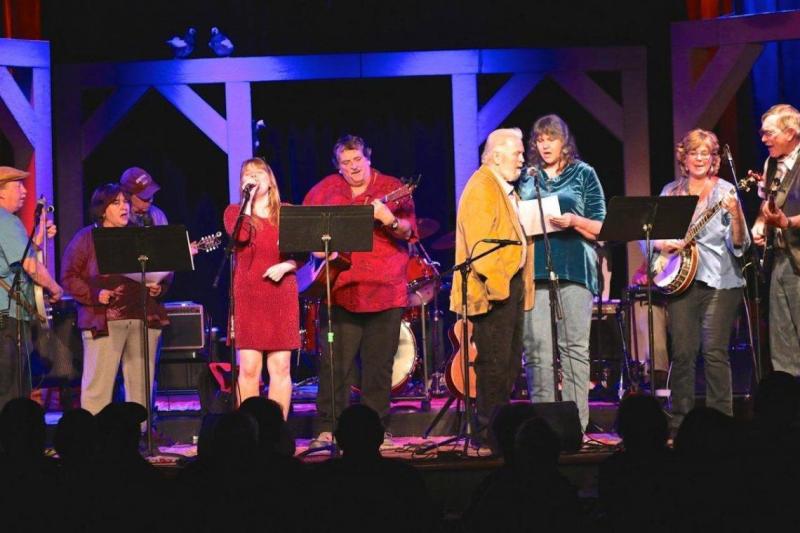 Garry Blackman and company during one of the 10 Hometown Hootenanny fundraisers for the Opera House. File photo
Garry Blackman and company during one of the 10 Hometown Hootenanny fundraisers for the Opera House. File photo
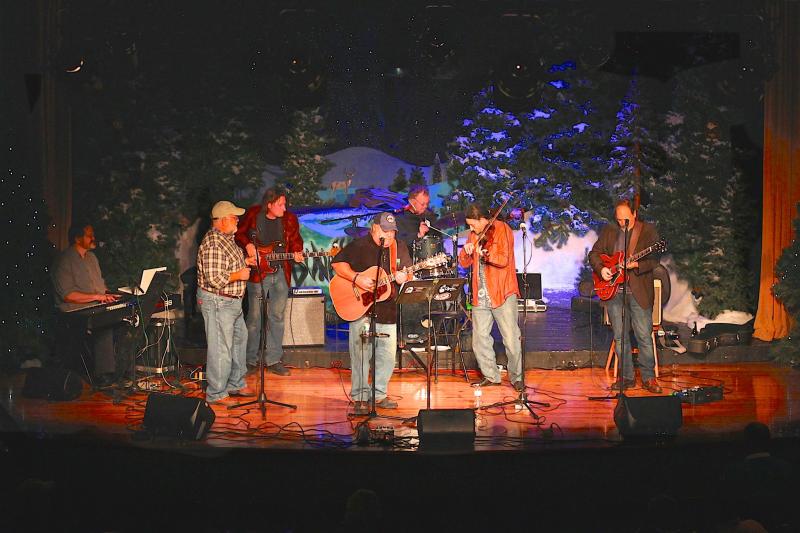 The Boneheads and The Holy Mackerels, frequent musicians in the grand old House. File photo
The Boneheads and The Holy Mackerels, frequent musicians in the grand old House. File photo
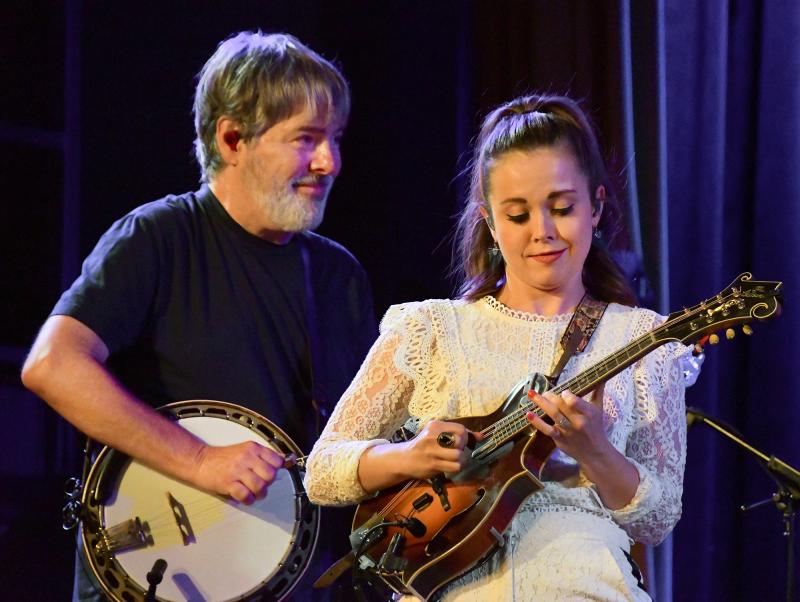 15-time Grammy winner Bela Fleck with Sierra Hull during the sold out Aug. 3 show this anniversary year. Peter Southwick photo
15-time Grammy winner Bela Fleck with Sierra Hull during the sold out Aug. 3 show this anniversary year. Peter Southwick photo
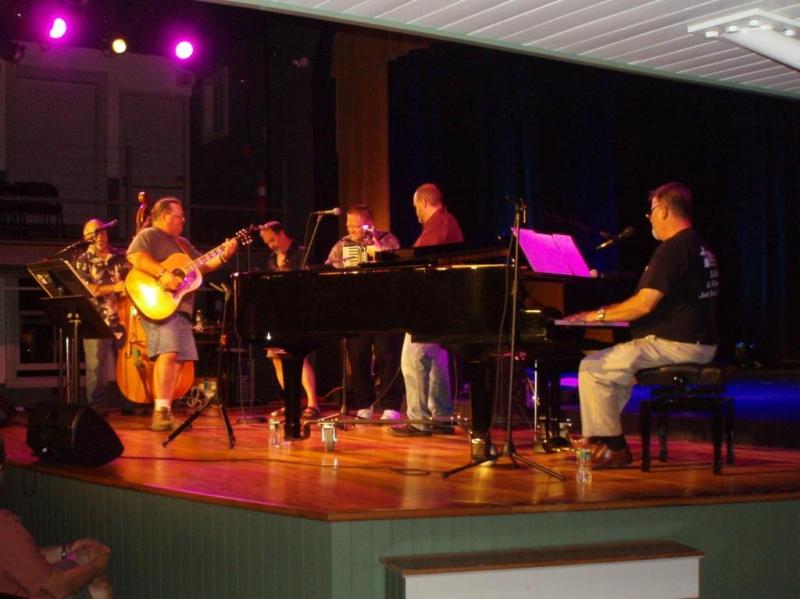 Local musicians joined Piano Man Danny Beal for many of his Good Time Hour and a Half shows. File photo
Local musicians joined Piano Man Danny Beal for many of his Good Time Hour and a Half shows. File photo
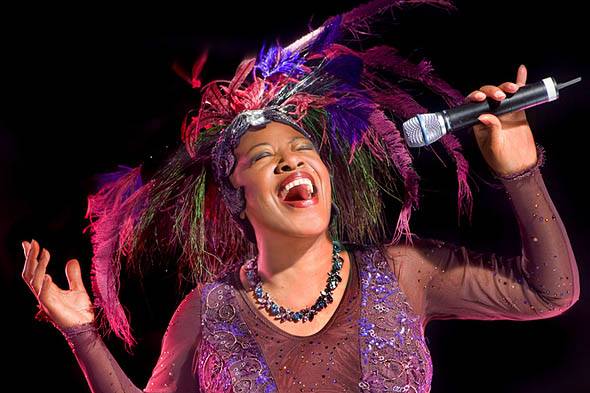 Francine Reed electrifies the House. Robert Mitchell photo
Francine Reed electrifies the House. Robert Mitchell photo
 Jerry Douglas. Peter Southwick photo
Jerry Douglas. Peter Southwick photo
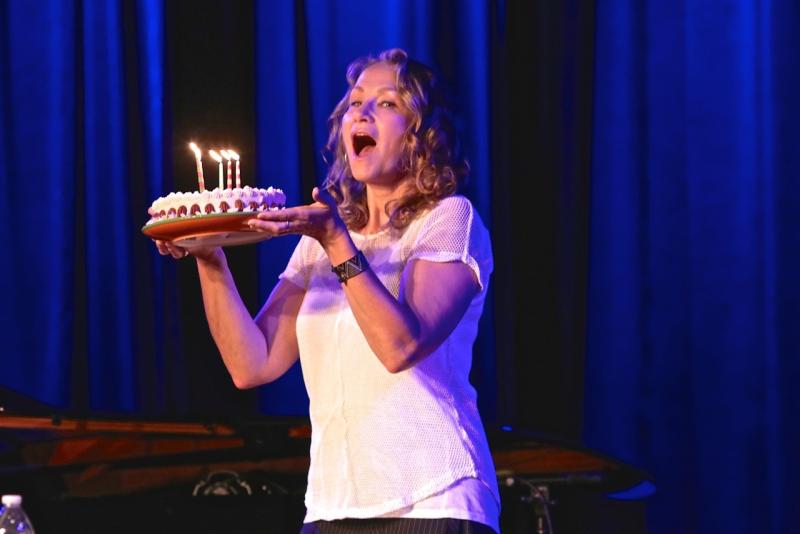 Joan Osborne performs on her birthday and is gifted with a cake. Robert Mitchell photo
Joan Osborne performs on her birthday and is gifted with a cake. Robert Mitchell photo
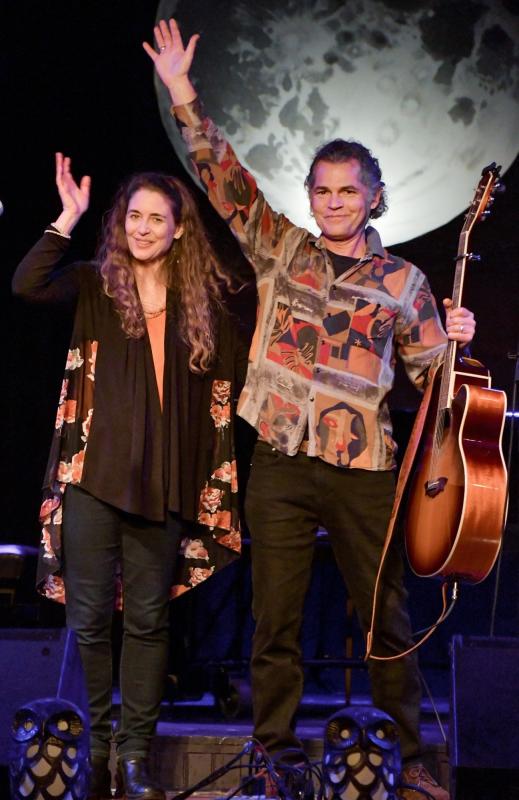 Boothbay Harbor native and author and singer Lara Tupper and her singer-songwriter husband Bobby Sweet. Peter Southwick photo
Boothbay Harbor native and author and singer Lara Tupper and her singer-songwriter husband Bobby Sweet. Peter Southwick photo
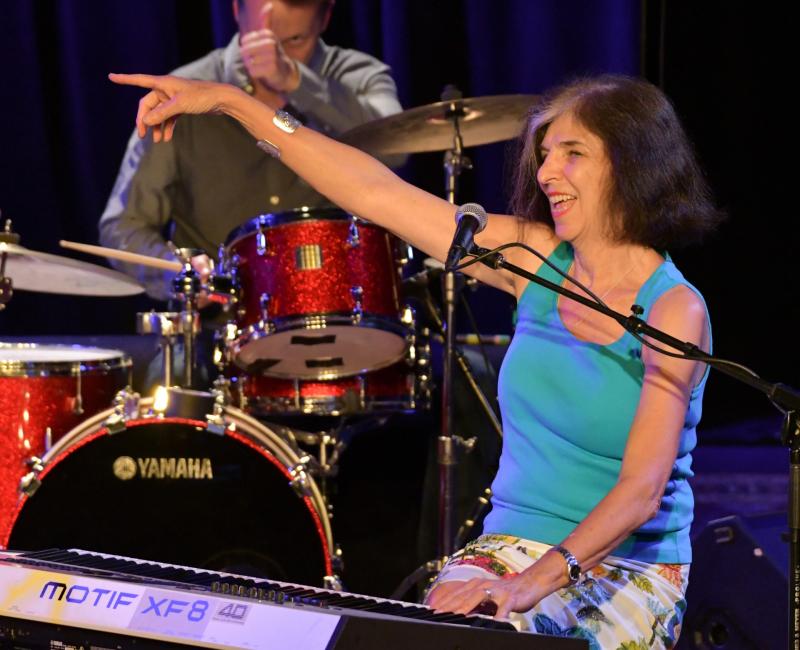 Marcia Ball. Peter Southwick photo
Marcia Ball. Peter Southwick photo
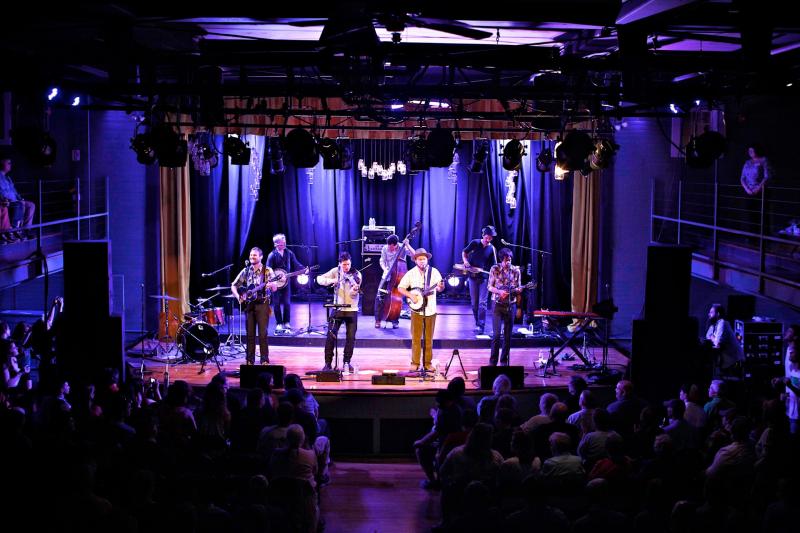 The Old Crow Medicine Show. Robert Mitchell photo
The Old Crow Medicine Show. Robert Mitchell photo
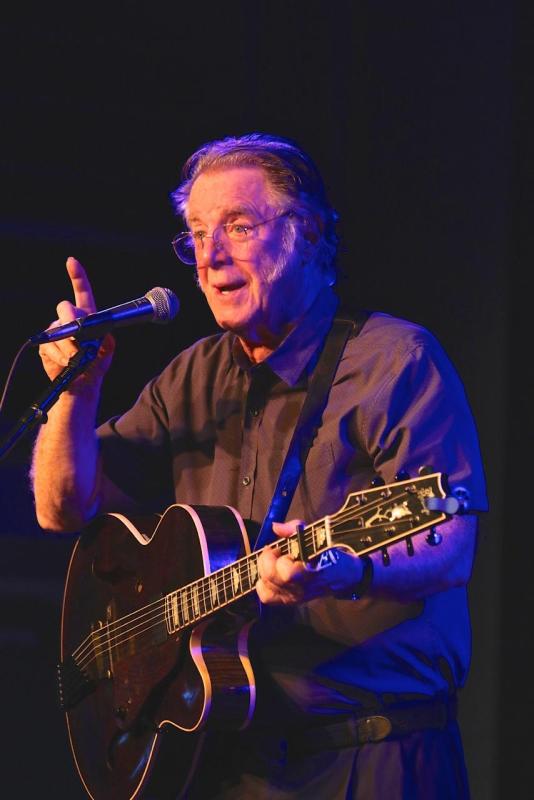 John Sebastian. Robert Mitchell photo
John Sebastian. Robert Mitchell photo
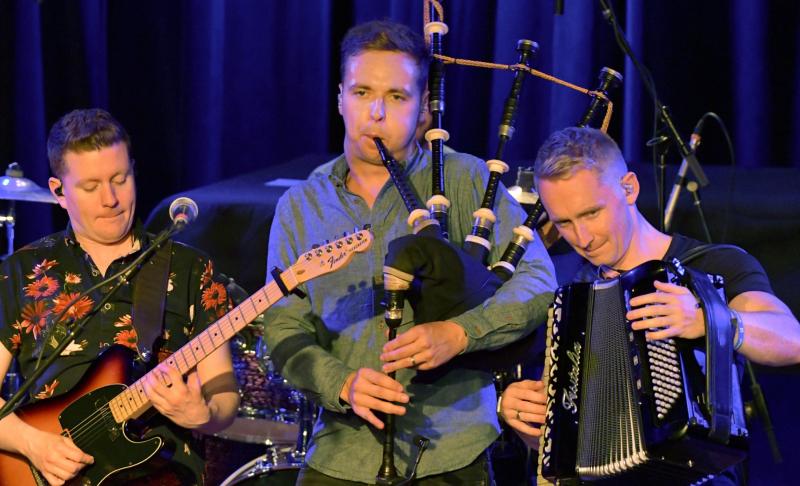 Skerryvore! Peter Southwick photo
Skerryvore! Peter Southwick photo
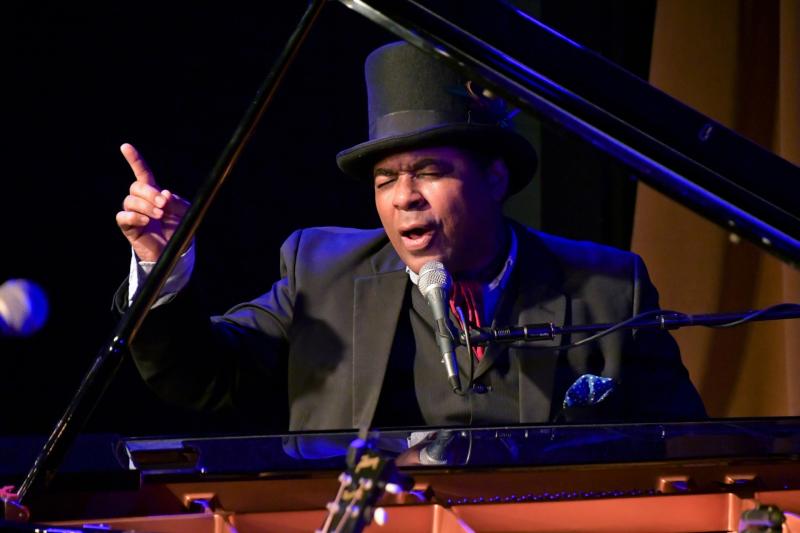 Chris Thomas King. Peter Southwick photo
Chris Thomas King. Peter Southwick photo
 Seth Glier. Courtesy of the Opera House
Seth Glier. Courtesy of the Opera House
 Dougie MacLean. Courtesy of the Opera House
Dougie MacLean. Courtesy of the Opera House
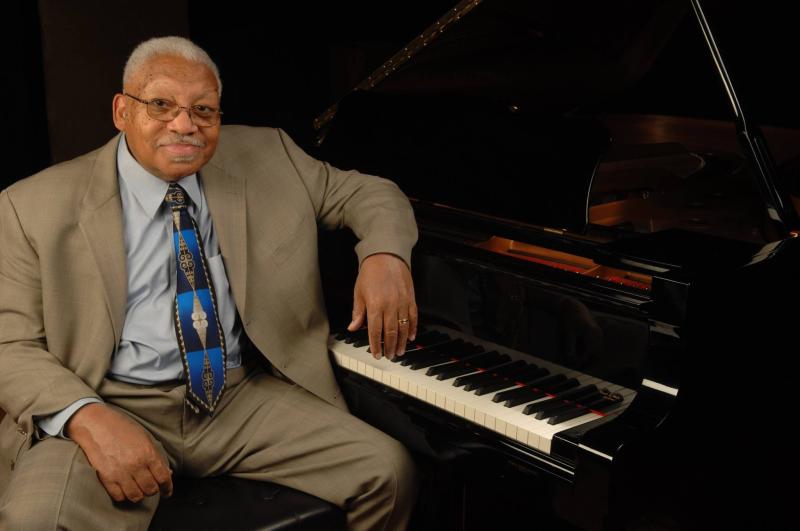 Ellis Marsalis. Courtesy of the Opera House
Ellis Marsalis. Courtesy of the Opera House
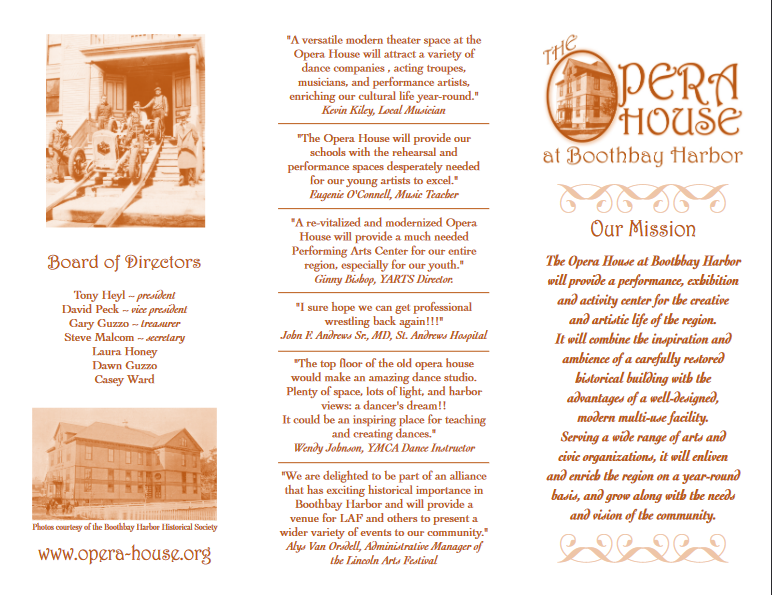 Original 2003 brochure. Courtesy of Atomic Studios
Original 2003 brochure. Courtesy of Atomic Studios
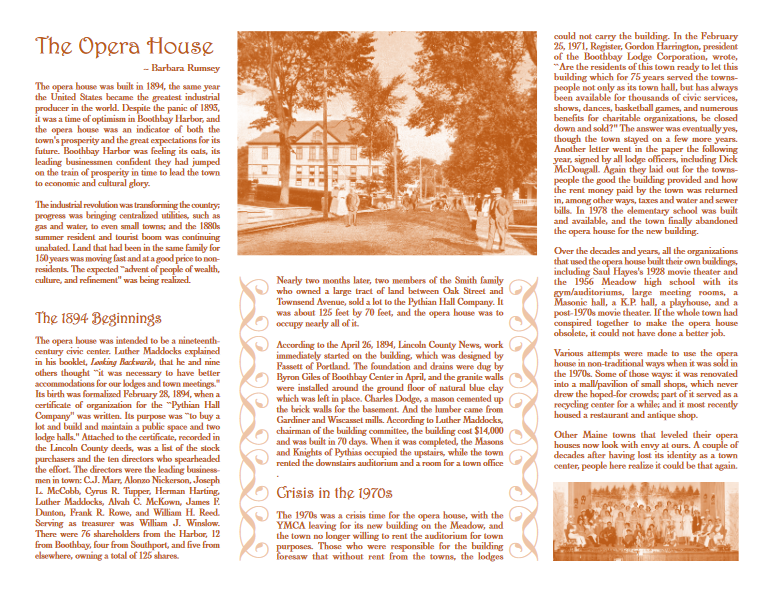 Original 2003 brochure. Courtesy of Atomic Studios
Original 2003 brochure. Courtesy of Atomic Studios
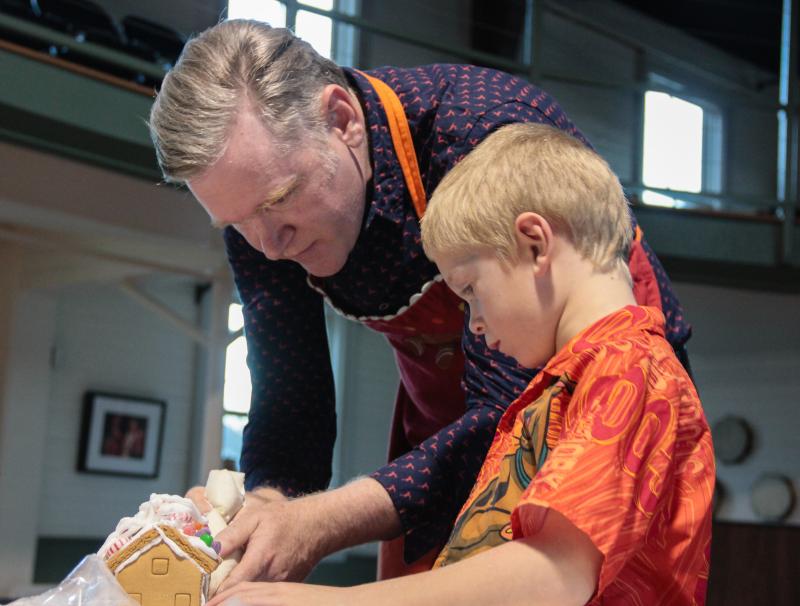 Gingerbread construction 101: Kevin Kiley assists an aspiring architect. Robert Mitchell photo
Gingerbread construction 101: Kevin Kiley assists an aspiring architect. Robert Mitchell photo
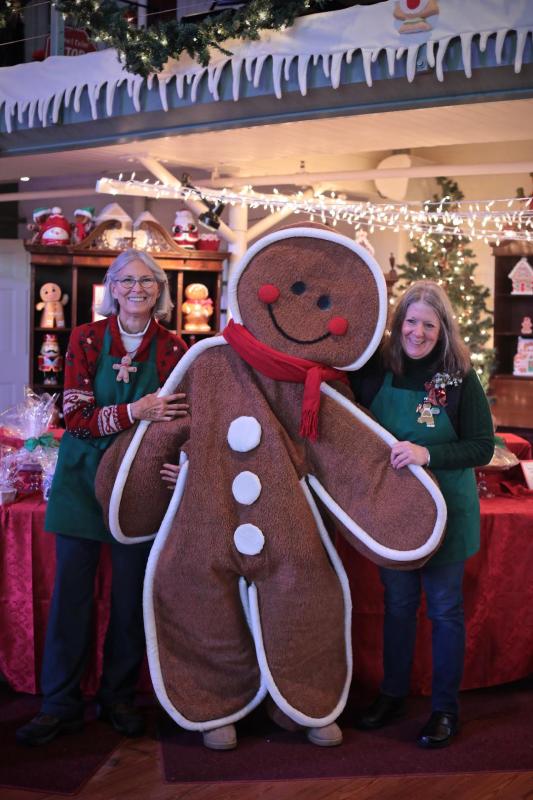 The Gingerbread Spectacular! From left: Martha Barrett, “Ginger” (Susan Endicott) and Susan Brackett. File photo
The Gingerbread Spectacular! From left: Martha Barrett, “Ginger” (Susan Endicott) and Susan Brackett. File photo
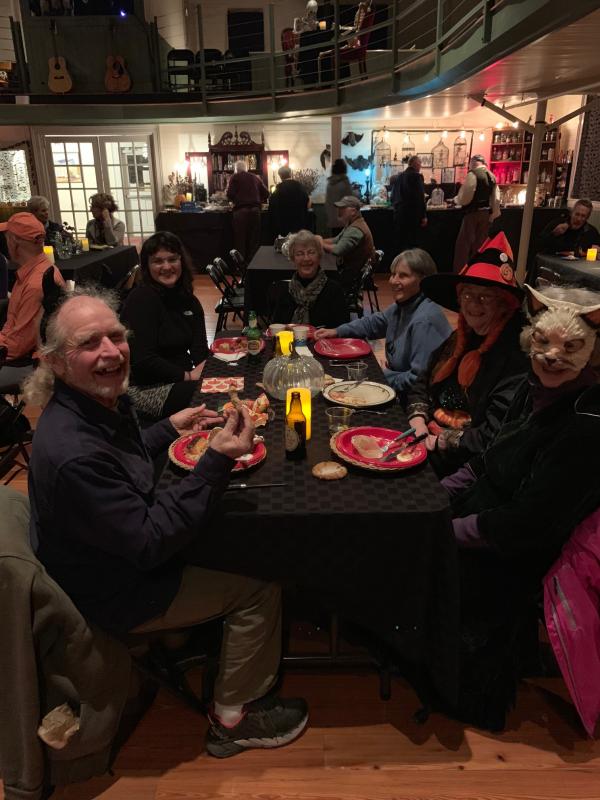 Halloween potluck. Courtesy photo
Halloween potluck. Courtesy photo
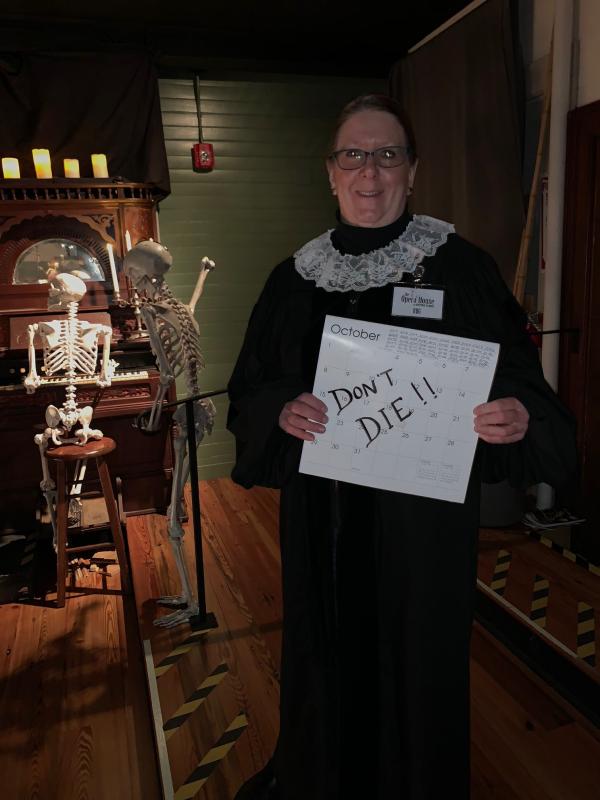 Susan Brackett with a message for those attending Halloween Scary Readings. Courtesy photo
Susan Brackett with a message for those attending Halloween Scary Readings. Courtesy photo
 A Pammy Award. LISA KRISTOFF/Boothbay Register
A Pammy Award. LISA KRISTOFF/Boothbay Register
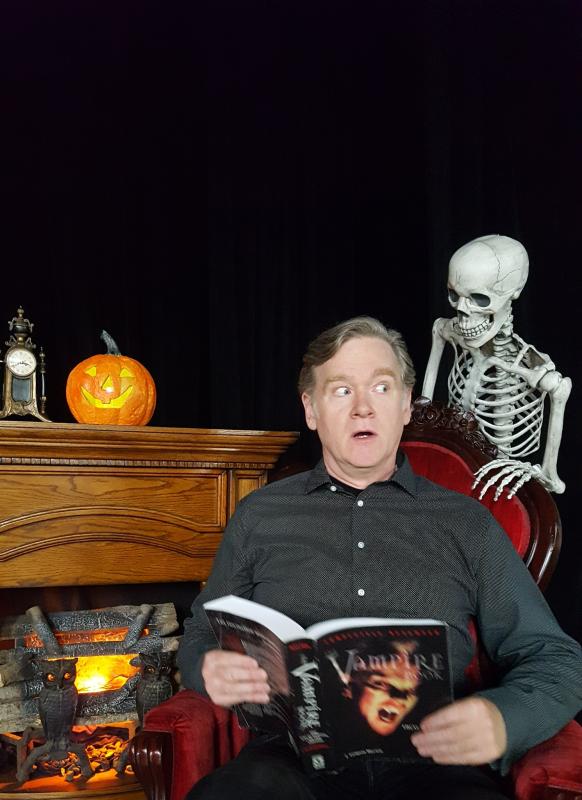 Kevin Kiley in one of his many humorous promotional photos for a Halloween Potluck and Scary Readings. Robert Mitchell photo
Kevin Kiley in one of his many humorous promotional photos for a Halloween Potluck and Scary Readings. Robert Mitchell photo
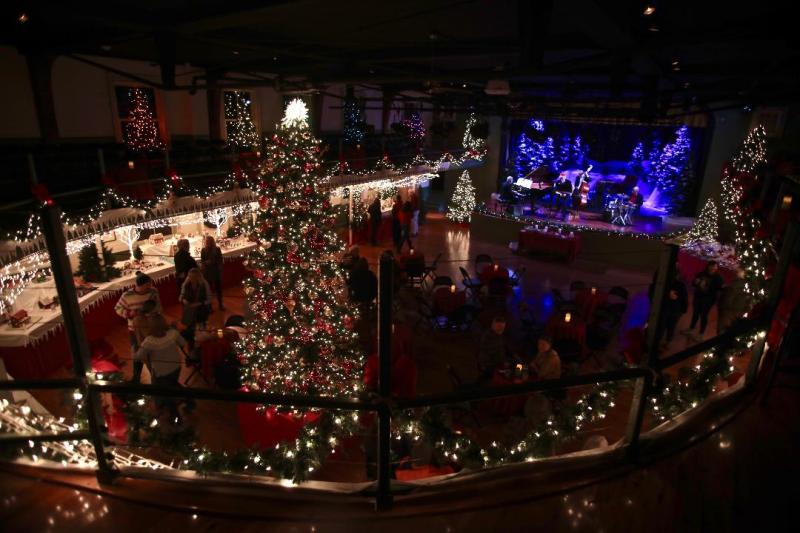 Kevin Kiley’s holiday magic, a joy to behold. File photo
Kevin Kiley’s holiday magic, a joy to behold. File photo
 Kevin Kiley. Courtesy of the Opera House
Kevin Kiley. Courtesy of the Opera House
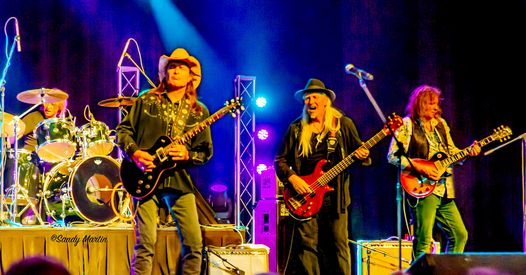 Once An Outlaw. Peter Southwick photo
Once An Outlaw. Peter Southwick photo
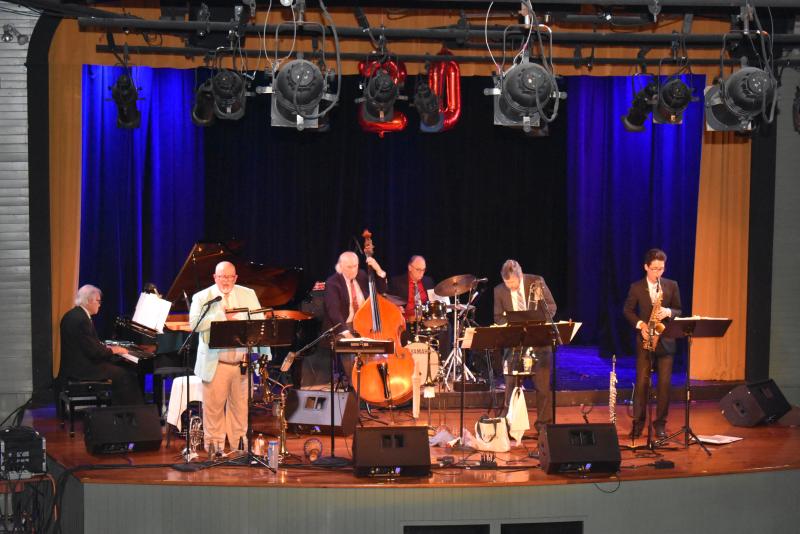 Barney Balch and Novel Jazz. LISA KRISTOFF/Boothbay Register
Barney Balch and Novel Jazz. LISA KRISTOFF/Boothbay Register
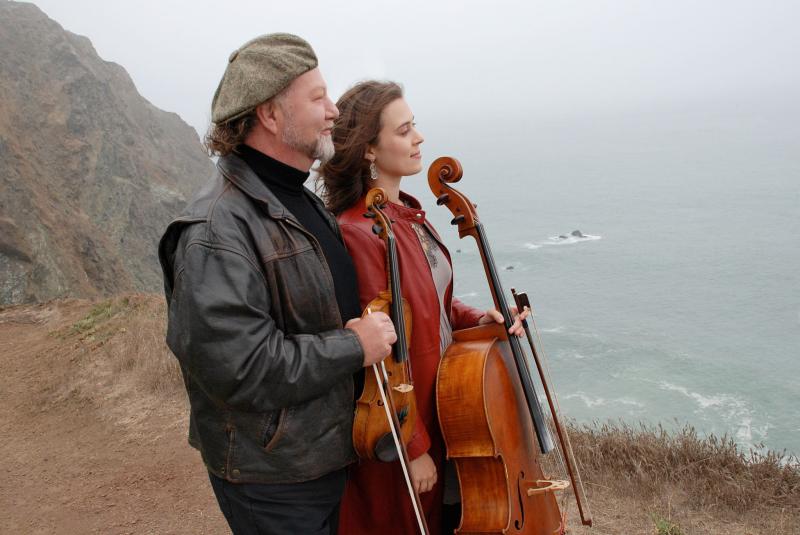 Alasdair Fraser and Natalie Haas. Courtesy of the Opera House
Alasdair Fraser and Natalie Haas. Courtesy of the Opera House
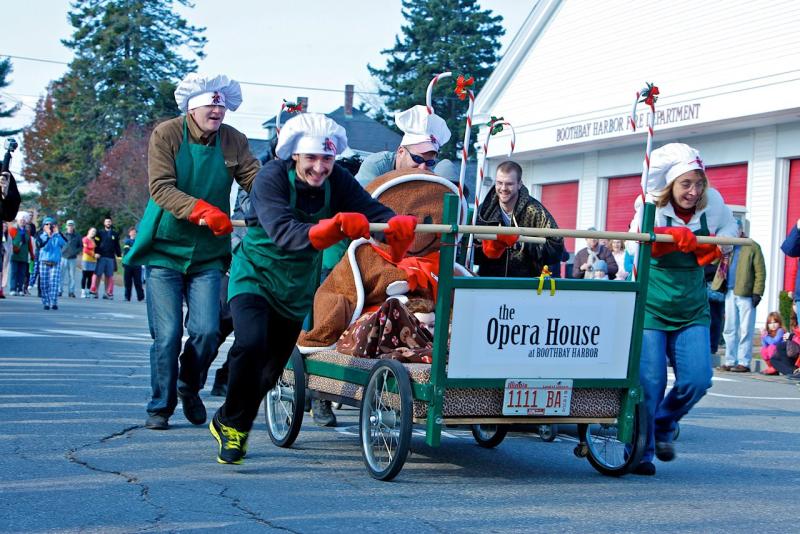 The Bed Races of 2012. Hold on Ginger! Courtesy photo
The Bed Races of 2012. Hold on Ginger! Courtesy photo
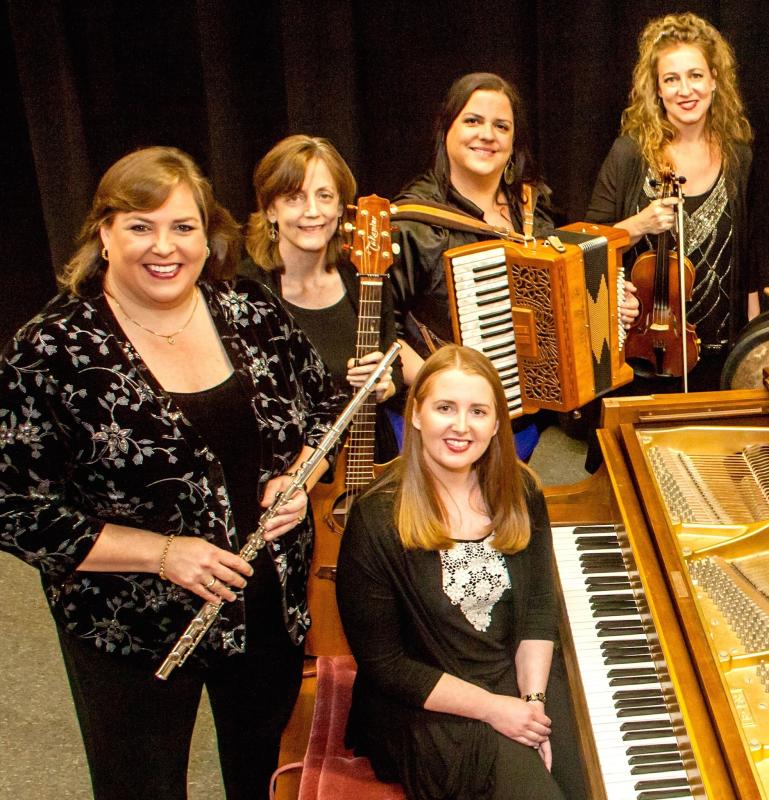 Cherish the Ladies. Courtesy of the Opera House
Cherish the Ladies. Courtesy of the Opera House
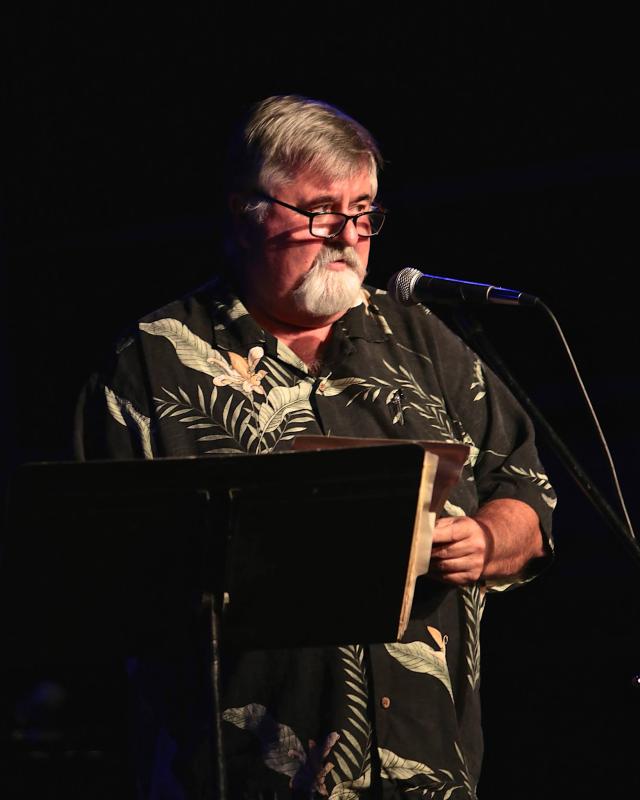 Danny Beal. File photo
Danny Beal. File photo
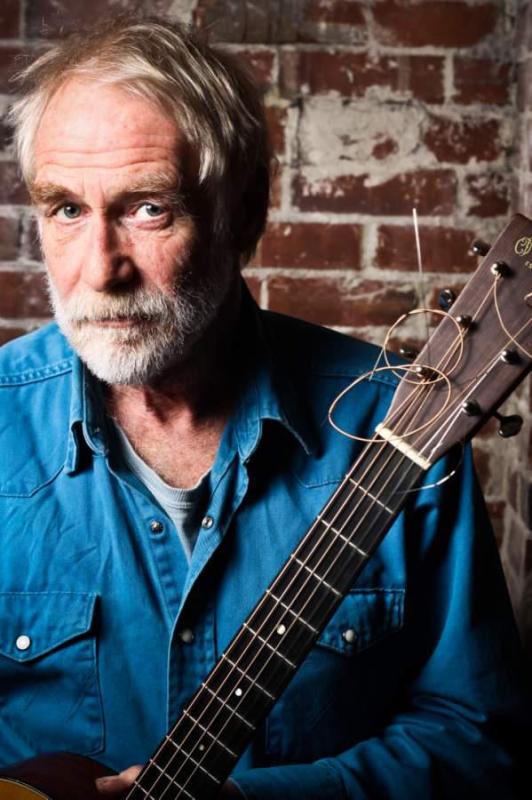 Dave Mallett. Courtesy of the Opera House
Dave Mallett. Courtesy of the Opera House
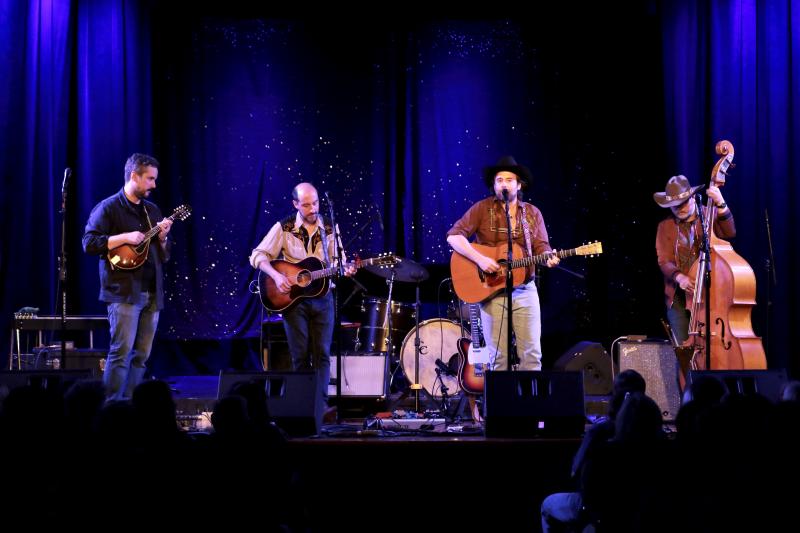 Gabe Tonon and Friends. Courtesy of the Opera House
Gabe Tonon and Friends. Courtesy of the Opera House
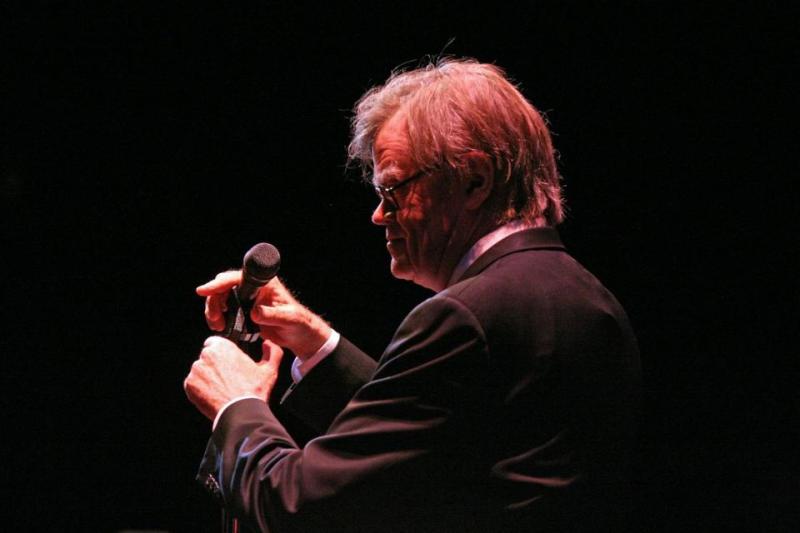 Garrison Keillor. Robert Mitchell photo
Garrison Keillor. Robert Mitchell photo
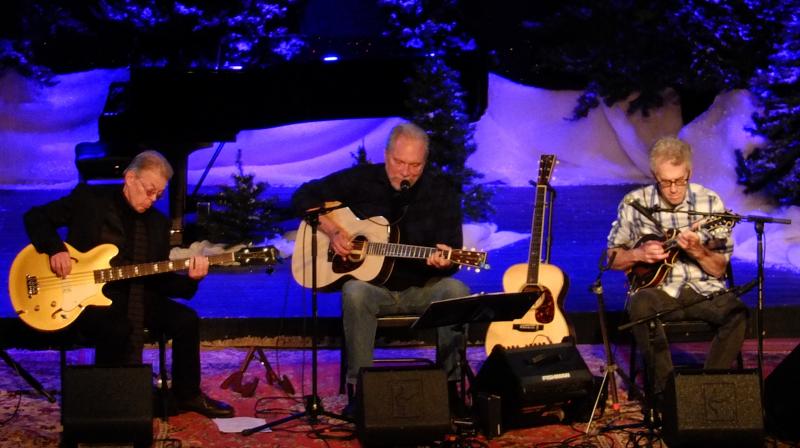 Hot Tuna 2014: Jack Cassady, Jorma Kaukonen with mandolinist Barry Mitterhoff. File photo
Hot Tuna 2014: Jack Cassady, Jorma Kaukonen with mandolinist Barry Mitterhoff. File photo
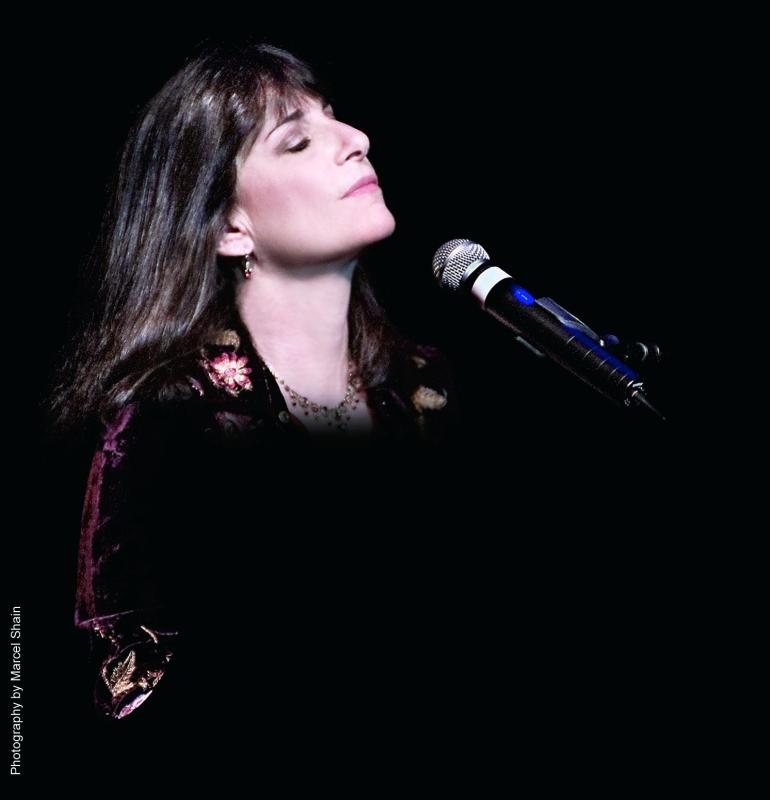 Karla Bonoff. Courtesy of the Opera House at Boothbay Harbor
Karla Bonoff. Courtesy of the Opera House at Boothbay Harbor
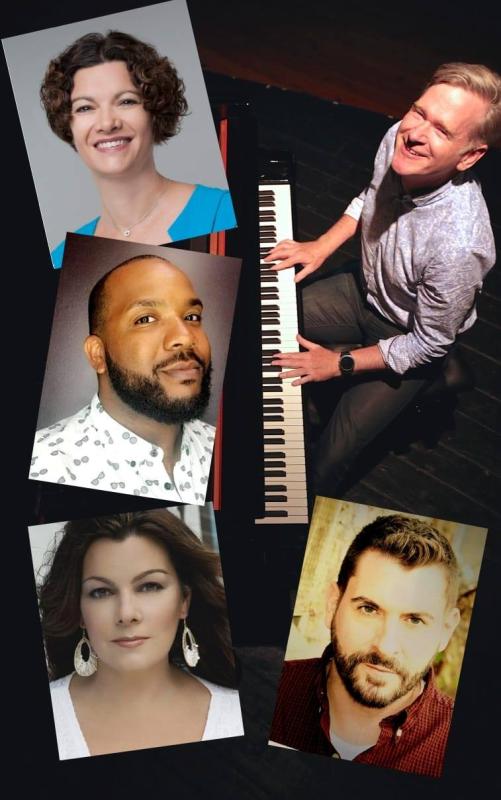 Kevin Kiley and Friends show poster. Courtesy of the Opera House at Boothbay Harbor
Kevin Kiley and Friends show poster. Courtesy of the Opera House at Boothbay Harbor
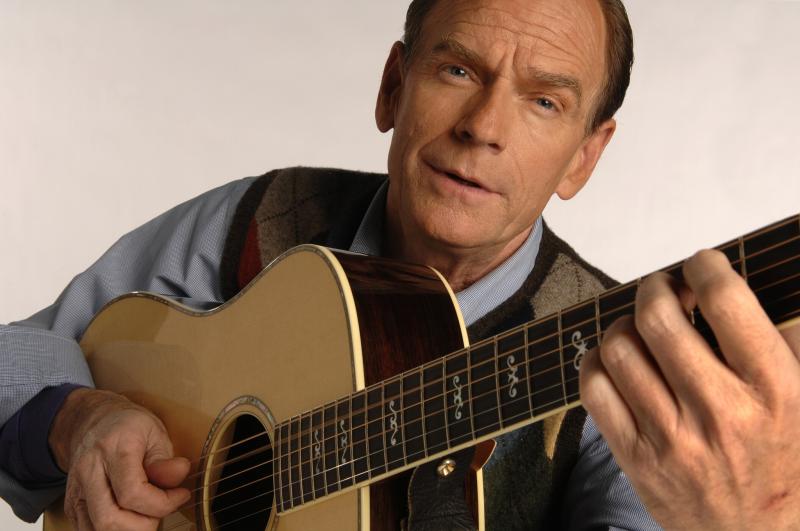 Livingston Taylor. Courtesy of the Opera House at Boothbay Harbor
Livingston Taylor. Courtesy of the Opera House at Boothbay Harbor
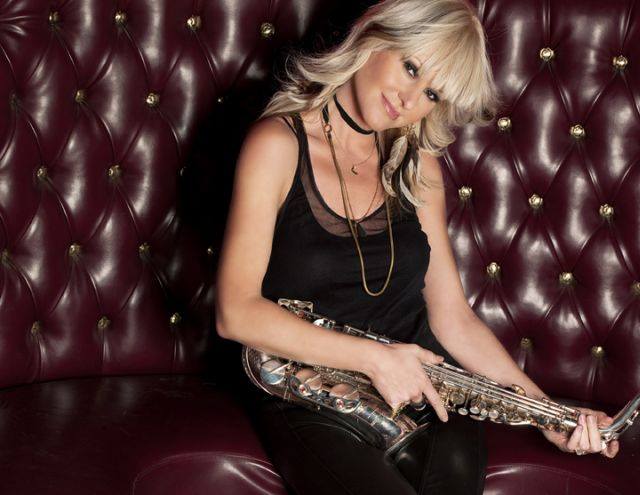 Mindy Abair. Courtesy of the Opera House at Boothbay Harbor
Mindy Abair. Courtesy of the Opera House at Boothbay Harbor
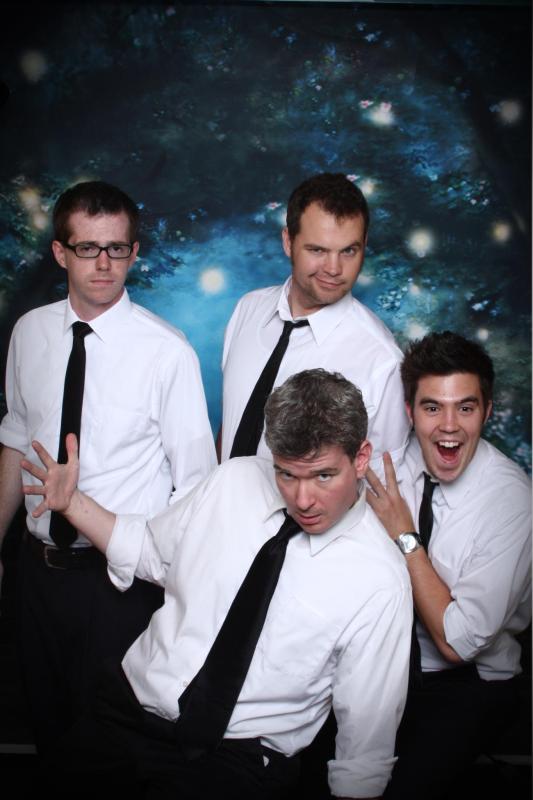 Mission Improvable comedy troupe from Chicago. Courtesy of the Opera House at Boothbay Harbor
Mission Improvable comedy troupe from Chicago. Courtesy of the Opera House at Boothbay Harbor
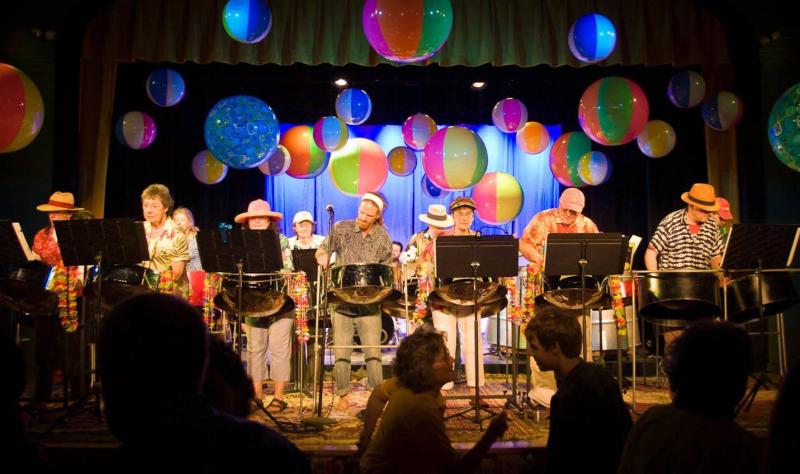 Pan Fried Steel’s annual spring show, decor by Kevin Kiley. Courtesy of the Opera House at Boothbay Harbor
Pan Fried Steel’s annual spring show, decor by Kevin Kiley. Courtesy of the Opera House at Boothbay Harbor
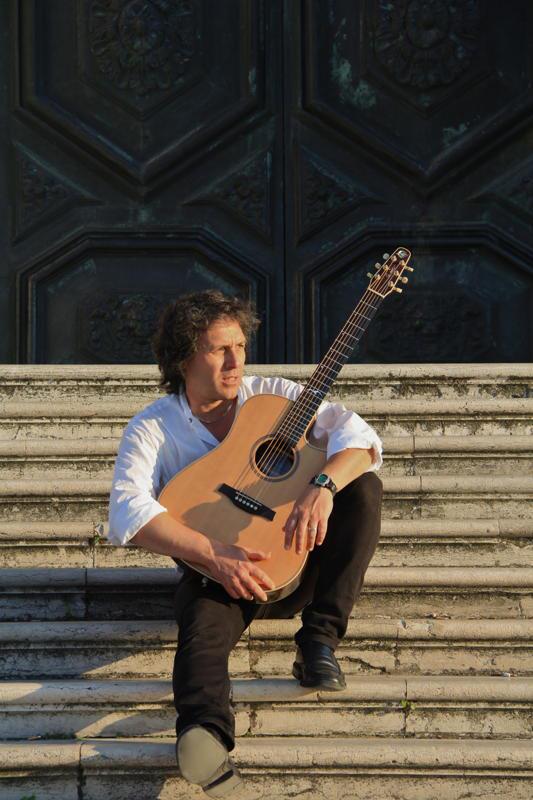 Peppino D’Agostino. Courtesy of the Opera House at Boothbay Harbor
Peppino D’Agostino. Courtesy of the Opera House at Boothbay Harbor
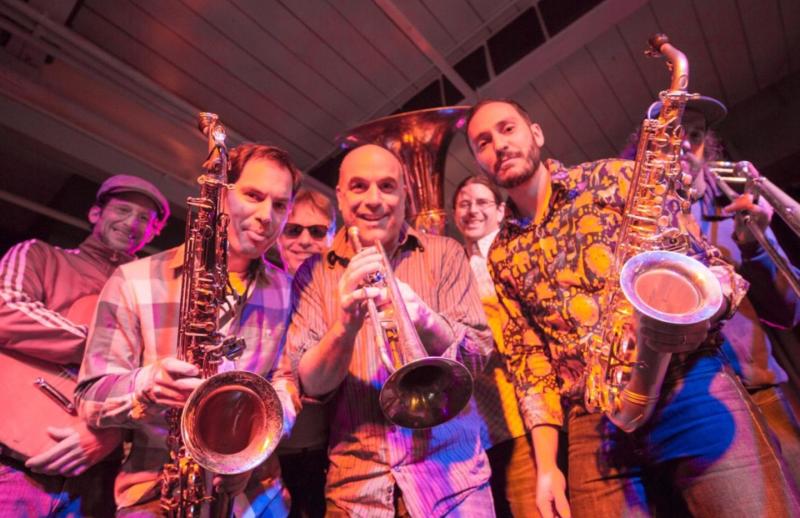 Raging Brass. Courtesy of the Opera House at Boothbay Harbor
Raging Brass. Courtesy of the Opera House at Boothbay Harbor
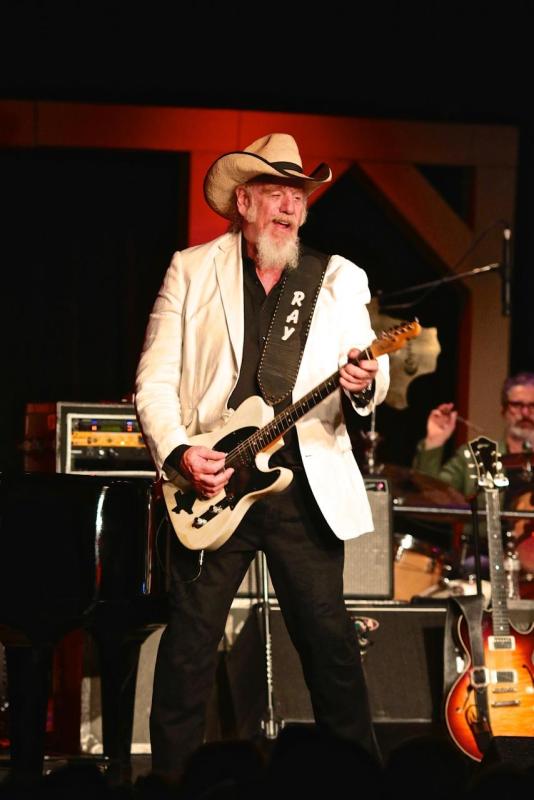 Ray Benson. Robert Mitchell photo
Ray Benson. Robert Mitchell photo
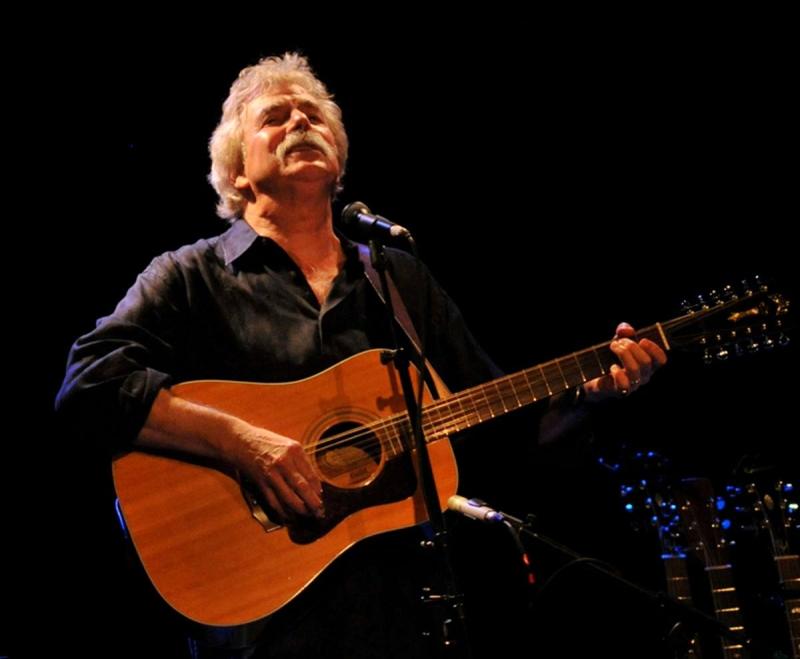 Tom Rush. Courtesy of the Opera House at Boothbay Harbor
Tom Rush. Courtesy of the Opera House at Boothbay Harbor
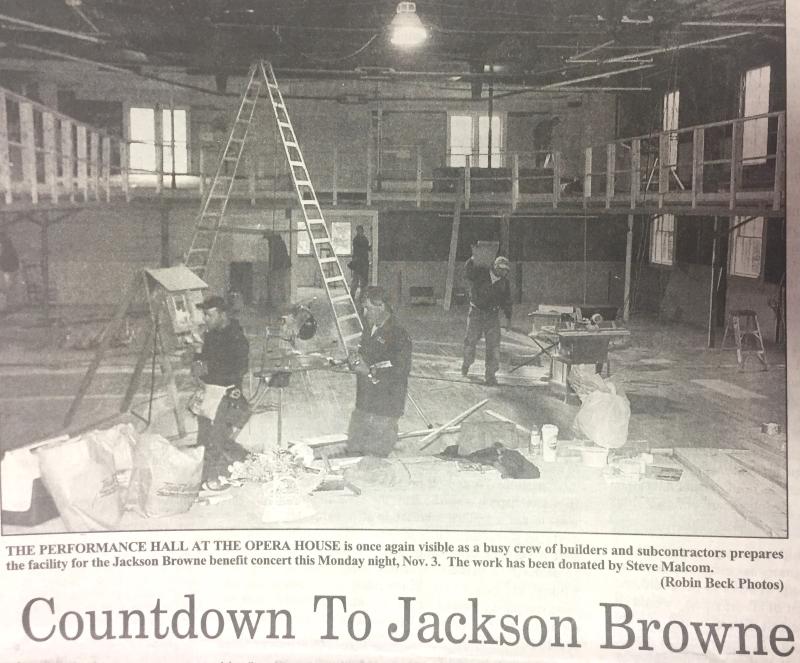 File photo
File photo
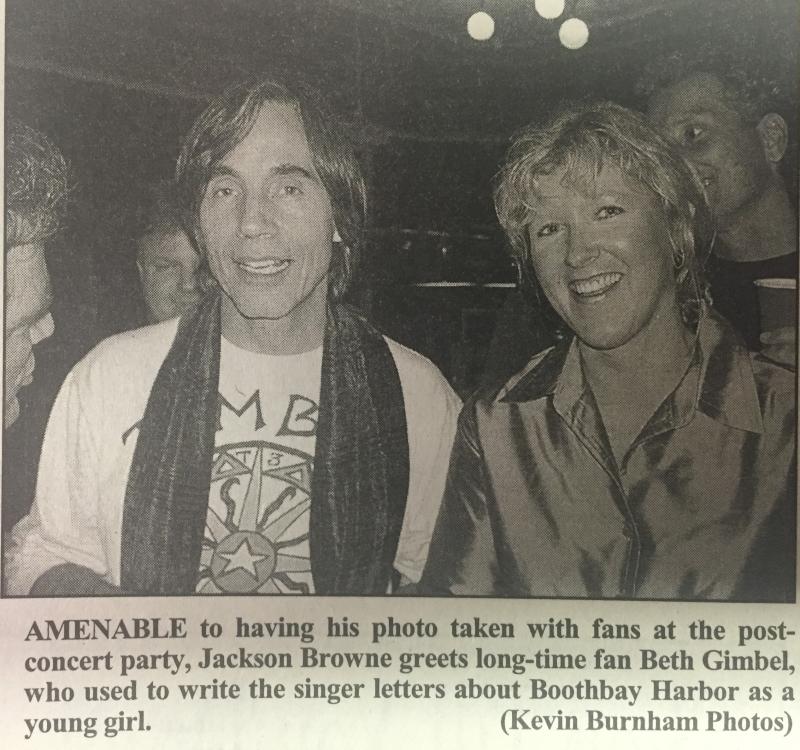 Beth Gimbel with Jackson Browne, 2003. File photo
Beth Gimbel with Jackson Browne, 2003. File photo
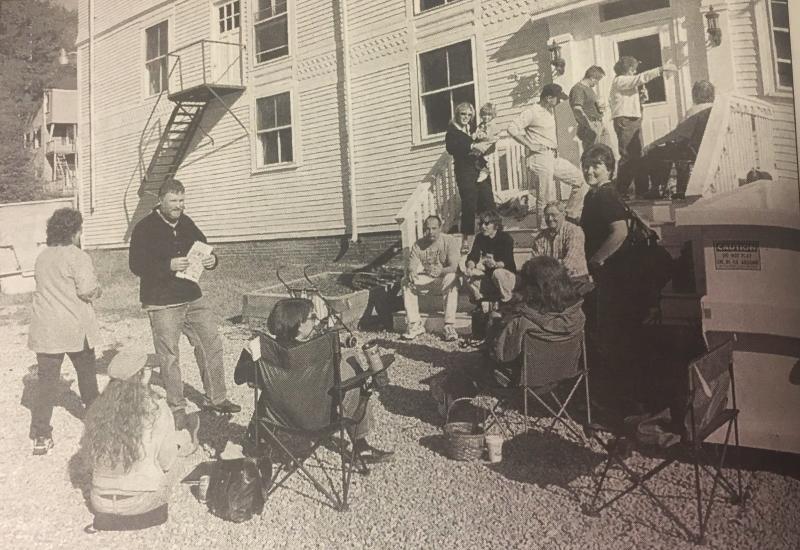 Ticket buyers for Jackson Browne 2003. A couple from Wells were first in line. File photo
Ticket buyers for Jackson Browne 2003. A couple from Wells were first in line. File photo
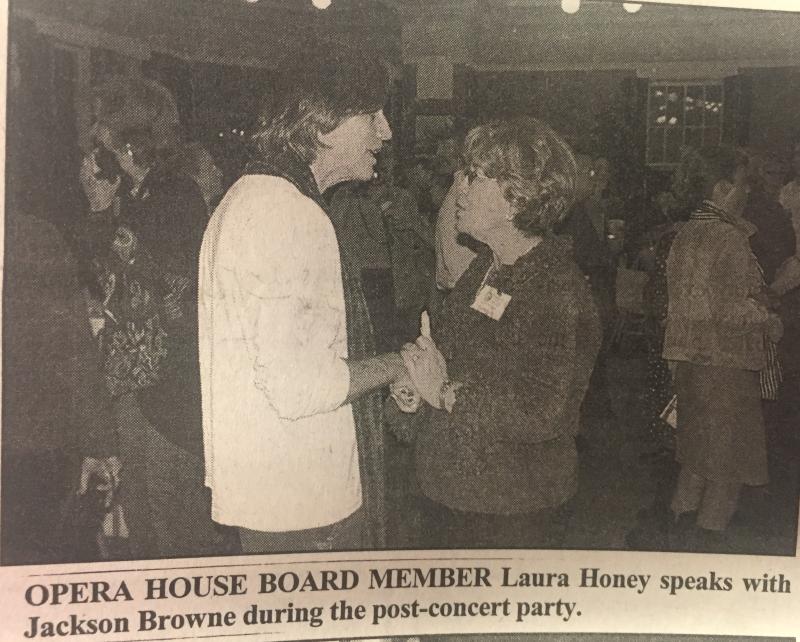 Opera House board member Laura Honey and Jackson Browne. File photo
Opera House board member Laura Honey and Jackson Browne. File photo
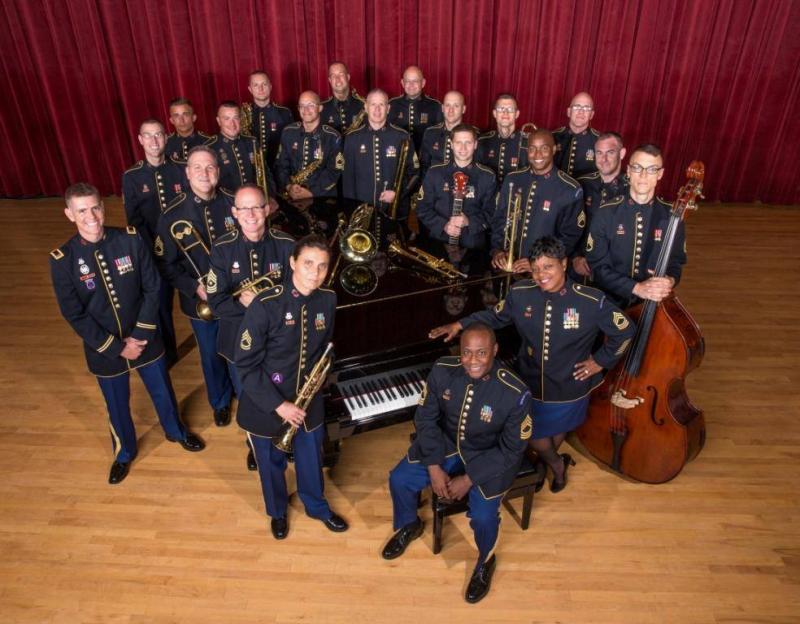 The U.S. Army Jazz Ambassadors. Courtesy of the Opera House at Boothbay Harbor
The U.S. Army Jazz Ambassadors. Courtesy of the Opera House at Boothbay Harbor
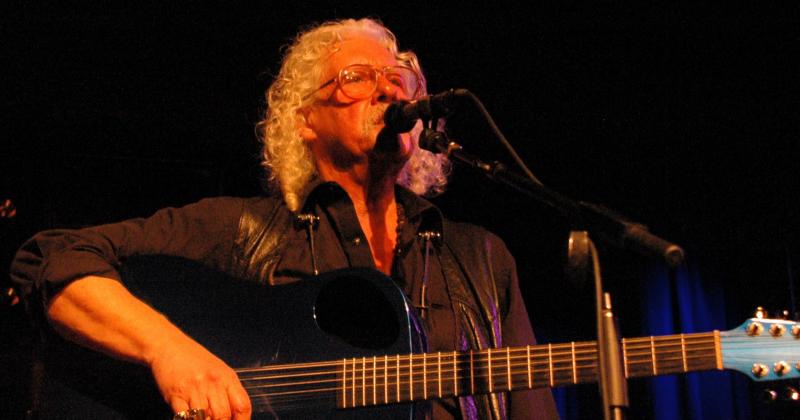 Arlo Guthrie, 2014. Ellie Busby photo
Arlo Guthrie, 2014. Ellie Busby photo
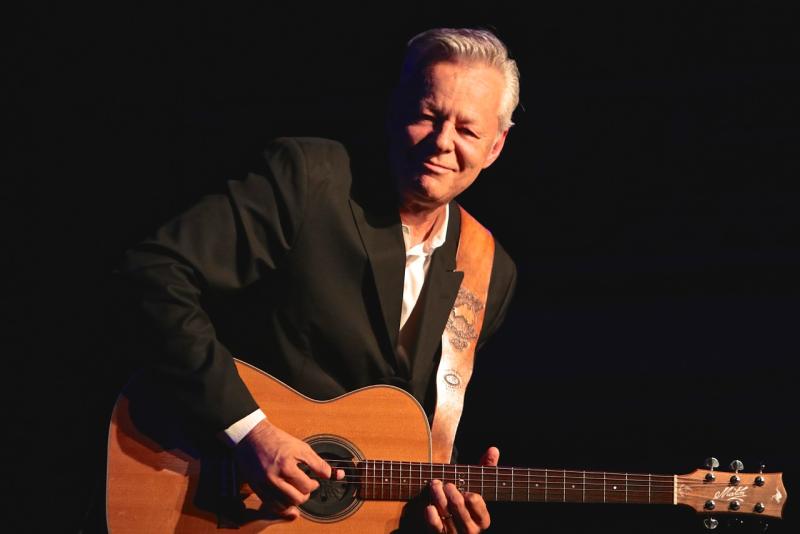 Tommy Emmanuel. Courtesy of the Opera House
Tommy Emmanuel. Courtesy of the Opera House
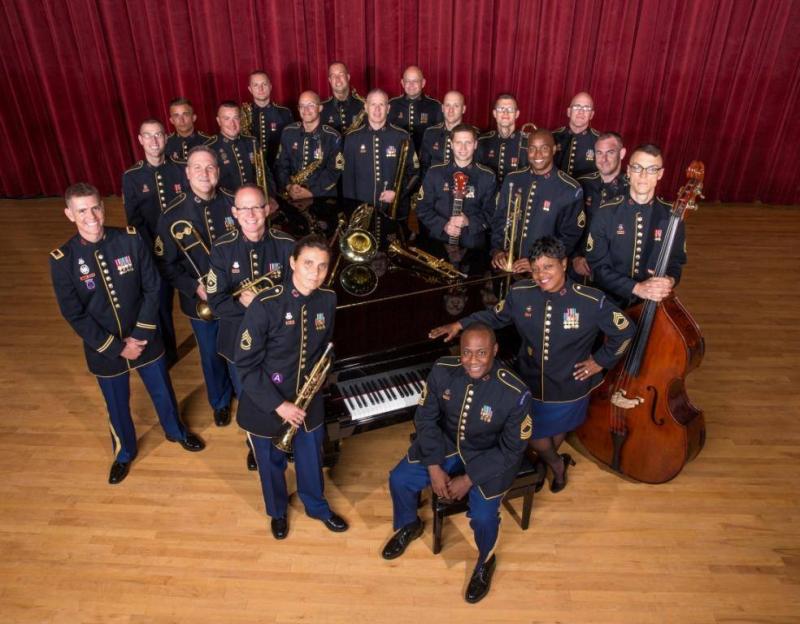 U.S. Army Jazz Ambassadors. Courtesy of the Opera House
U.S. Army Jazz Ambassadors. Courtesy of the Opera House
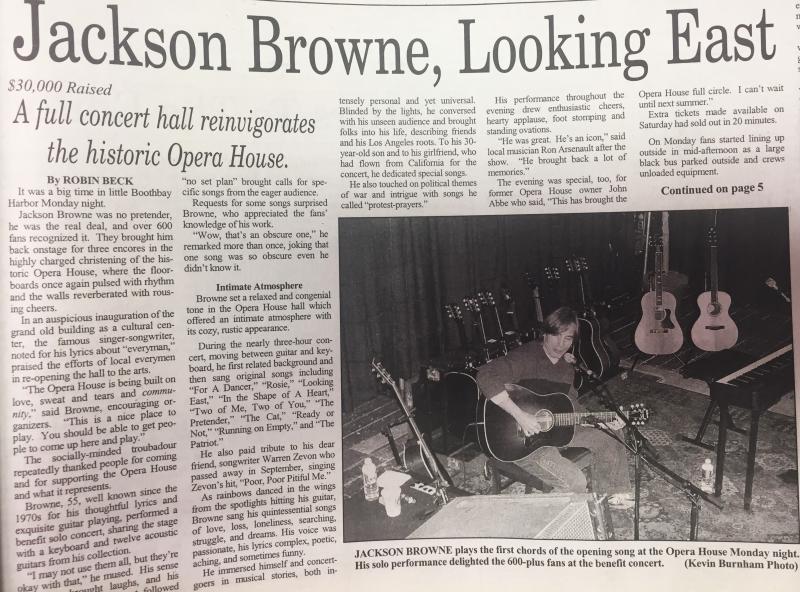 Boothbay Register files
Boothbay Register files
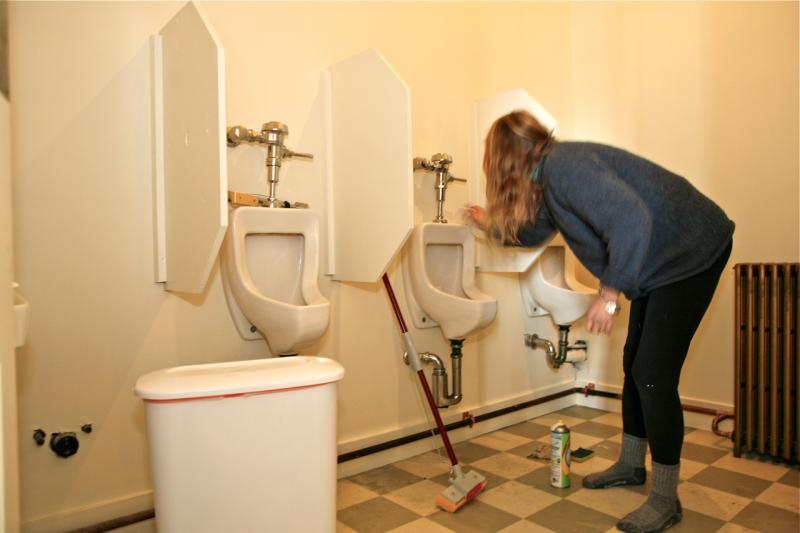 Volunteer Susan Endicott. Courtesy of the Opera House
Volunteer Susan Endicott. Courtesy of the Opera House
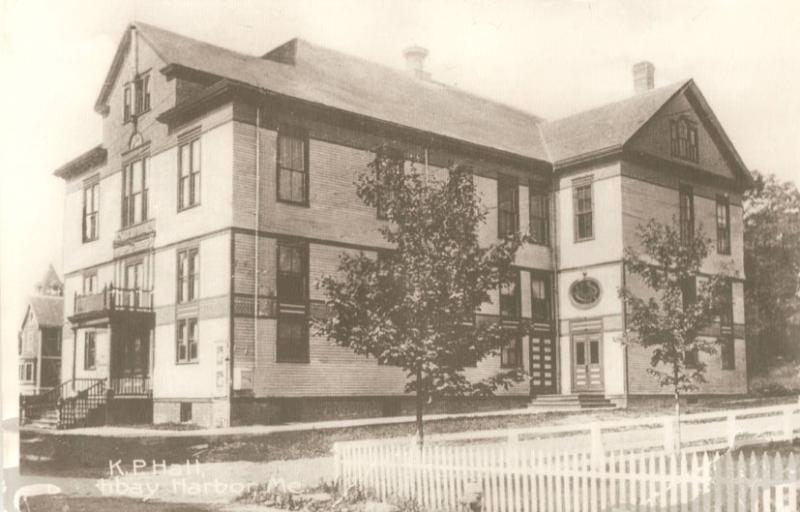 Courtesy of the Opera House at Boothbay Harbor website
Courtesy of the Opera House at Boothbay Harbor website
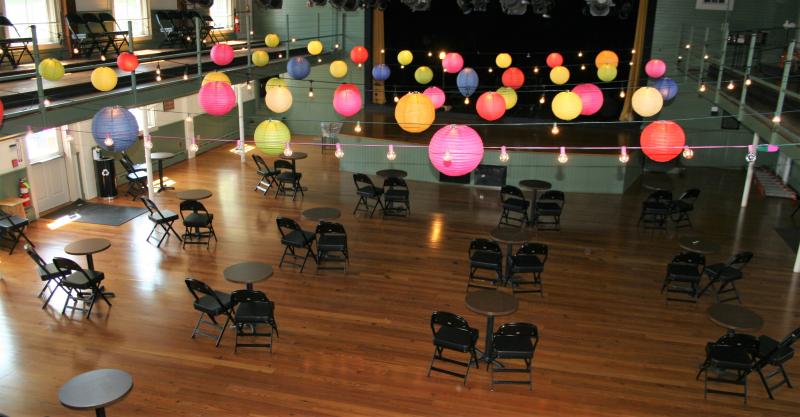 Caribbean Night set up for 50 in July 2020. File photo
Caribbean Night set up for 50 in July 2020. File photo
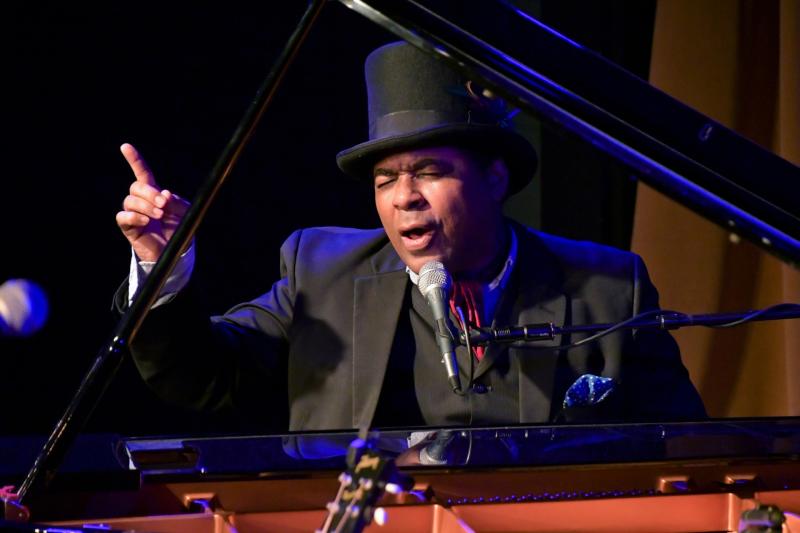 Chris Thomas King. Peter Southwick photo
Chris Thomas King. Peter Southwick photo
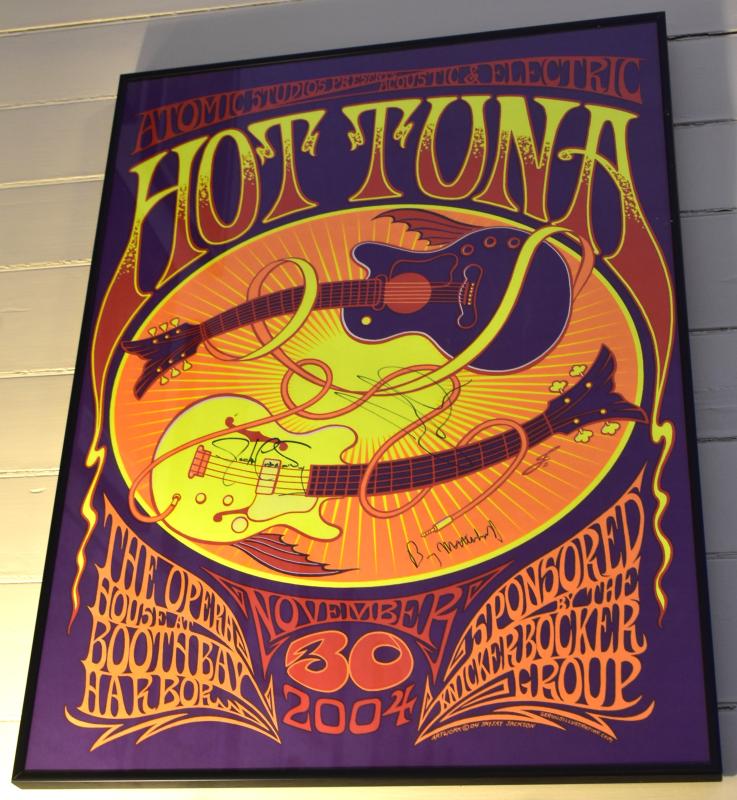 2004 Hot Tuna poster by Atomic Studios. File photo
2004 Hot Tuna poster by Atomic Studios. File photo
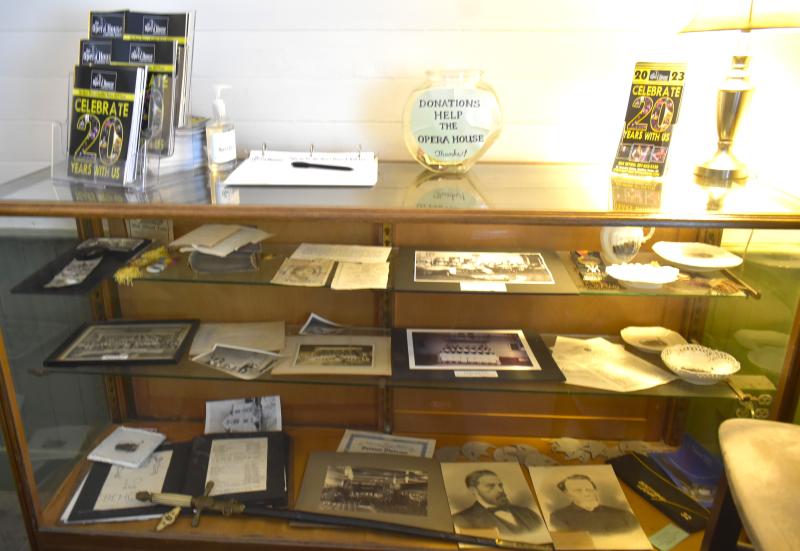 Historic display case. LISA KRISTOFF/Boothbay Register
Historic display case. LISA KRISTOFF/Boothbay Register
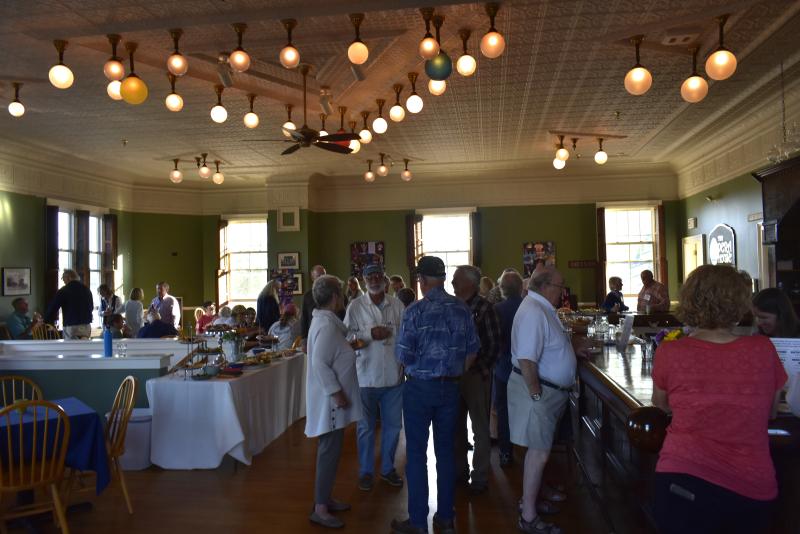 The historic bar was the scene of a recent event held to honor volunteers and members. LISA KRISTOFF/Boothbay Register
The historic bar was the scene of a recent event held to honor volunteers and members. LISA KRISTOFF/Boothbay Register
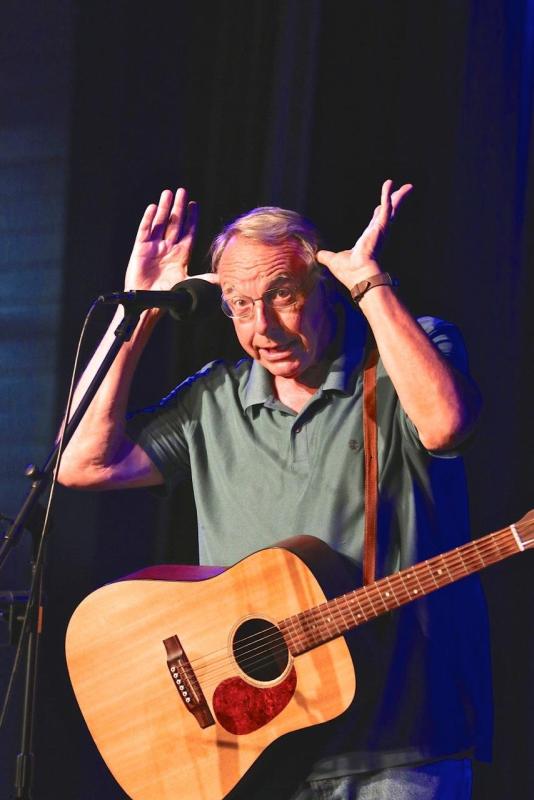 Tim Sample. Courtesy of the Opera House
Tim Sample. Courtesy of the Opera House
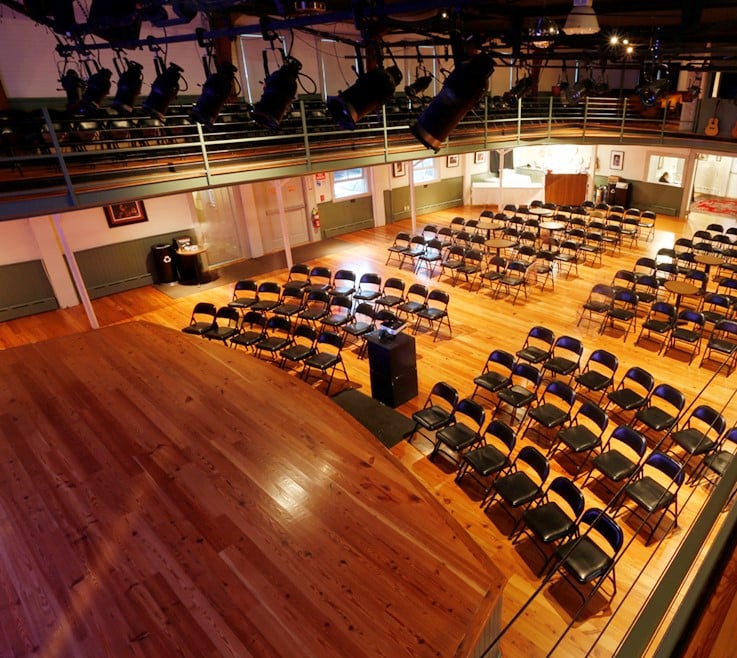 View from stage right. Opera House FB page
View from stage right. Opera House FB page
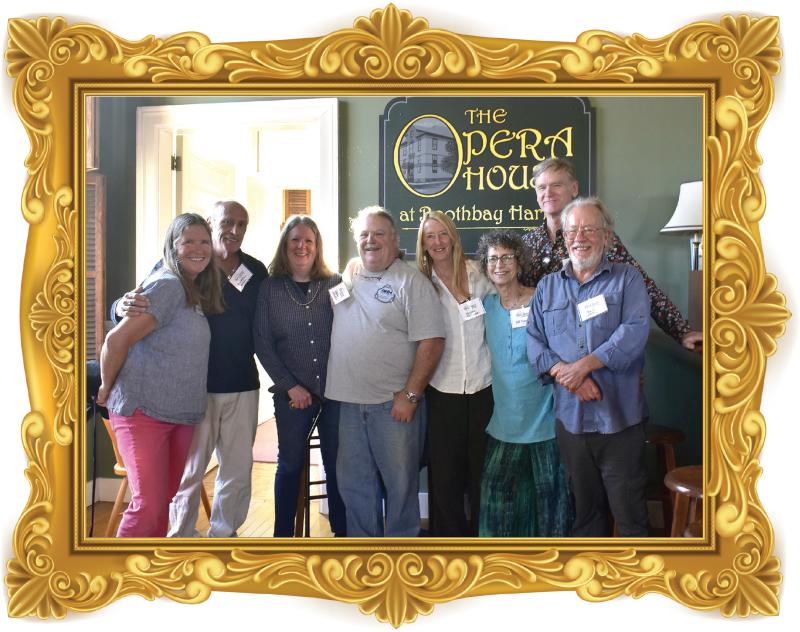 Longtime stewards, from left: Cathy Sherrill, Mike Marr, Susan Brackett, Mark Stover, Susan Endicott, Jill Tupper, Kevin Kiley and Tony Heyl. LISA KRISTOFF/Boothbay Register
Longtime stewards, from left: Cathy Sherrill, Mike Marr, Susan Brackett, Mark Stover, Susan Endicott, Jill Tupper, Kevin Kiley and Tony Heyl. LISA KRISTOFF/Boothbay Register
 A ghost light has shone on the stage of the saved Opera House at Boothbay Harbor since 2004. File photo
A ghost light has shone on the stage of the saved Opera House at Boothbay Harbor since 2004. File photo
 Opera House purchase announcement, September 2003. File photo
Opera House purchase announcement, September 2003. File photo
 Old interior. File photo
Old interior. File photo
 The performance hall pre-restoration. File photo
The performance hall pre-restoration. File photo
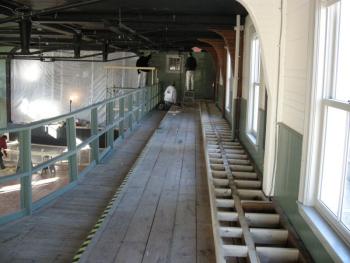 2008 balcony re-do. File photo
2008 balcony re-do. File photo
 Demo outside the House’s Townsend Avenue-facing entrance. File photo
Demo outside the House’s Townsend Avenue-facing entrance. File photo
 Steve Malcom and Mark Stover hang lights for the 2003 Jackson Browne benefit concert. Cathy Sherrill supervises from below. File photo
Steve Malcom and Mark Stover hang lights for the 2003 Jackson Browne benefit concert. Cathy Sherrill supervises from below. File photo
 Jackson Browne’s November 2003 benefit concert. Robert Mitchell photo
Jackson Browne’s November 2003 benefit concert. Robert Mitchell photo
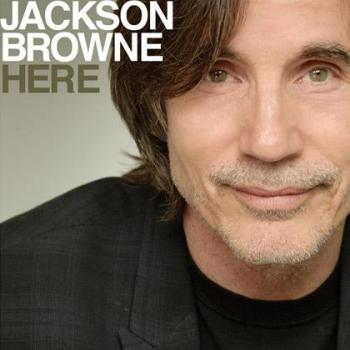 Opera House poster for Jackson Browne’s second show for the 10th anniversary. Courtesy of the Opera House at Boothbay Harbor
Opera House poster for Jackson Browne’s second show for the 10th anniversary. Courtesy of the Opera House at Boothbay Harbor
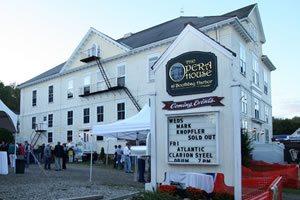 Mark Knopfler billboard 2006. Courtesy of the Opera House at Boothbay Harbor
Mark Knopfler billboard 2006. Courtesy of the Opera House at Boothbay Harbor
 Setting the stage for Mark Knopfler. Courtesy of the Opera House at Boothbay Harbor
Setting the stage for Mark Knopfler. Courtesy of the Opera House at Boothbay Harbor
 Mark Knopfler performs a benefit concert for the Opera House at Boothbay Harbor. File photo
Mark Knopfler performs a benefit concert for the Opera House at Boothbay Harbor. File photo
 Audience at Knopfler concert. File photo
Audience at Knopfler concert. File photo
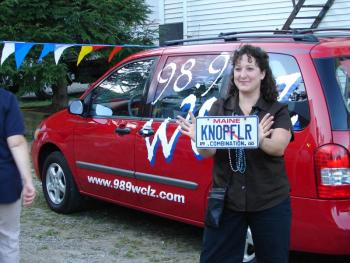 Big fan at the Opera House benefit. File photo
Big fan at the Opera House benefit. File photo
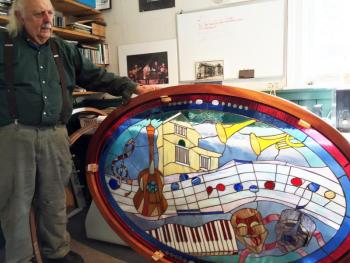 Master stained glass artist Dick Macdonald designed and made the new oval window. File photo
Master stained glass artist Dick Macdonald designed and made the new oval window. File photo
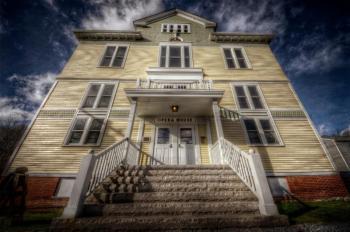 The Opera House at Boothbay Harbor was the image for April 2014 in a Haunted New England calendar created by Ghost Adventures paranormal researcher Jeff Belanger. Frank Grace photo
The Opera House at Boothbay Harbor was the image for April 2014 in a Haunted New England calendar created by Ghost Adventures paranormal researcher Jeff Belanger. Frank Grace photo
 Cathy Sherrill, The Opera House at Boothbay Harbor’s executive director for 17 years. LISA KRISTOFF/Boothbay Register
Cathy Sherrill, The Opera House at Boothbay Harbor’s executive director for 17 years. LISA KRISTOFF/Boothbay Register
 Garry Blackman and company during one of the 10 Hometown Hootenanny fundraisers for the Opera House. File photo
Garry Blackman and company during one of the 10 Hometown Hootenanny fundraisers for the Opera House. File photo
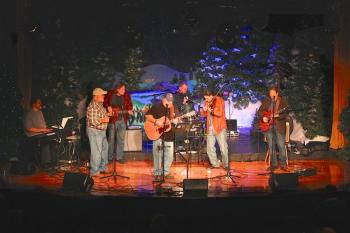 The Boneheads and The Holy Mackerels, frequent musicians in the grand old House. File photo
The Boneheads and The Holy Mackerels, frequent musicians in the grand old House. File photo
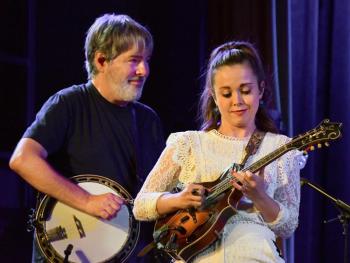 15-time Grammy winner Bela Fleck with Sierra Hull during the sold out Aug. 3 show this anniversary year. Peter Southwick photo
15-time Grammy winner Bela Fleck with Sierra Hull during the sold out Aug. 3 show this anniversary year. Peter Southwick photo
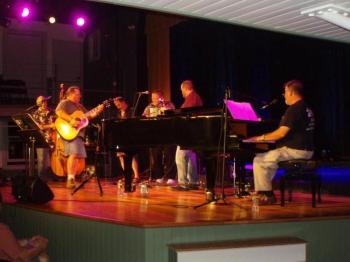 Local musicians joined Piano Man Danny Beal for many of his Good Time Hour and a Half shows. File photo
Local musicians joined Piano Man Danny Beal for many of his Good Time Hour and a Half shows. File photo
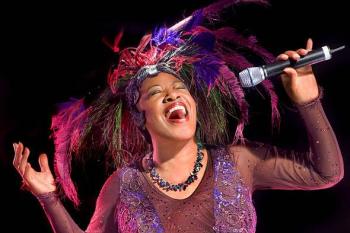 Francine Reed electrifies the House. Robert Mitchell photo
Francine Reed electrifies the House. Robert Mitchell photo
 Jerry Douglas. Peter Southwick photo
Jerry Douglas. Peter Southwick photo
 Joan Osborne performs on her birthday and is gifted with a cake. Robert Mitchell photo
Joan Osborne performs on her birthday and is gifted with a cake. Robert Mitchell photo
 Boothbay Harbor native and author and singer Lara Tupper and her singer-songwriter husband Bobby Sweet. Peter Southwick photo
Boothbay Harbor native and author and singer Lara Tupper and her singer-songwriter husband Bobby Sweet. Peter Southwick photo
 Marcia Ball. Peter Southwick photo
Marcia Ball. Peter Southwick photo
 The Old Crow Medicine Show. Robert Mitchell photo
The Old Crow Medicine Show. Robert Mitchell photo
 John Sebastian. Robert Mitchell photo
John Sebastian. Robert Mitchell photo
 Skerryvore! Peter Southwick photo
Skerryvore! Peter Southwick photo
 Chris Thomas King. Peter Southwick photo
Chris Thomas King. Peter Southwick photo
 Seth Glier. Courtesy of the Opera House
Seth Glier. Courtesy of the Opera House
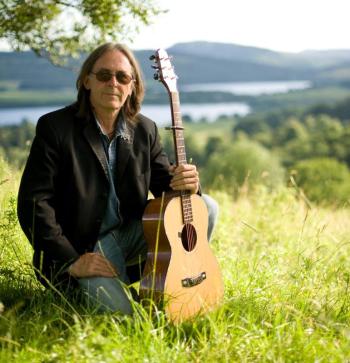 Dougie MacLean. Courtesy of the Opera House
Dougie MacLean. Courtesy of the Opera House
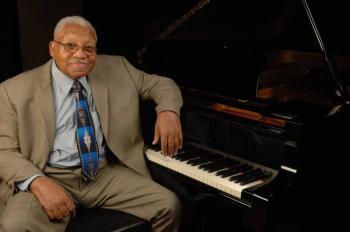 Ellis Marsalis. Courtesy of the Opera House
Ellis Marsalis. Courtesy of the Opera House
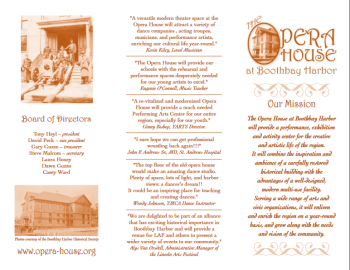 Original 2003 brochure. Courtesy of Atomic Studios
Original 2003 brochure. Courtesy of Atomic Studios
 Original 2003 brochure. Courtesy of Atomic Studios
Original 2003 brochure. Courtesy of Atomic Studios
 Gingerbread construction 101: Kevin Kiley assists an aspiring architect. Robert Mitchell photo
Gingerbread construction 101: Kevin Kiley assists an aspiring architect. Robert Mitchell photo
 The Gingerbread Spectacular! From left: Martha Barrett, “Ginger” (Susan Endicott) and Susan Brackett. File photo
The Gingerbread Spectacular! From left: Martha Barrett, “Ginger” (Susan Endicott) and Susan Brackett. File photo
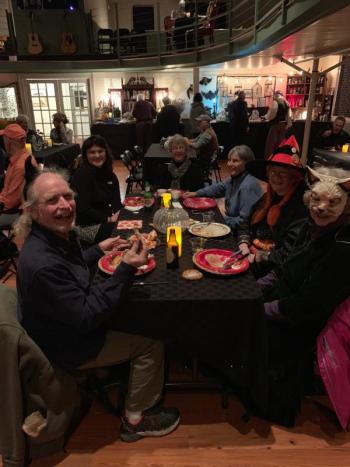 Halloween potluck. Courtesy photo
Halloween potluck. Courtesy photo
 Susan Brackett with a message for those attending Halloween Scary Readings. Courtesy photo
Susan Brackett with a message for those attending Halloween Scary Readings. Courtesy photo
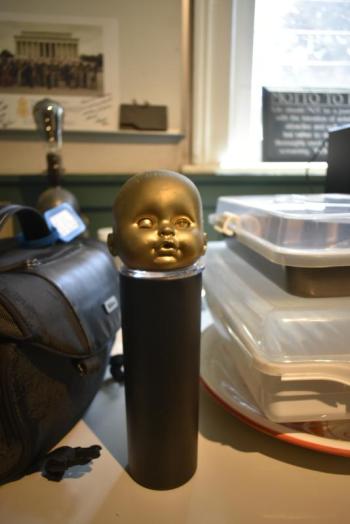 A Pammy Award. LISA KRISTOFF/Boothbay Register
A Pammy Award. LISA KRISTOFF/Boothbay Register
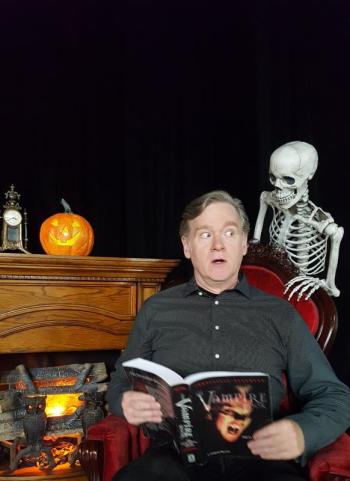 Kevin Kiley in one of his many humorous promotional photos for a Halloween Potluck and Scary Readings. Robert Mitchell photo
Kevin Kiley in one of his many humorous promotional photos for a Halloween Potluck and Scary Readings. Robert Mitchell photo
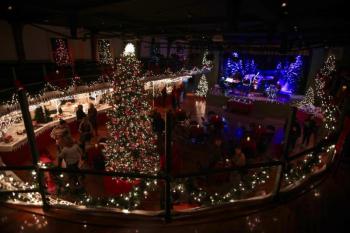 Kevin Kiley’s holiday magic, a joy to behold. File photo
Kevin Kiley’s holiday magic, a joy to behold. File photo
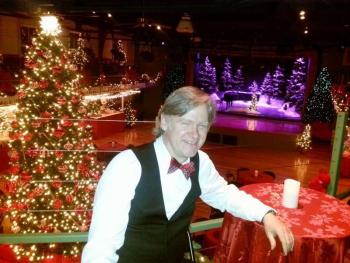 Kevin Kiley. Courtesy of the Opera House
Kevin Kiley. Courtesy of the Opera House
 Once An Outlaw. Peter Southwick photo
Once An Outlaw. Peter Southwick photo
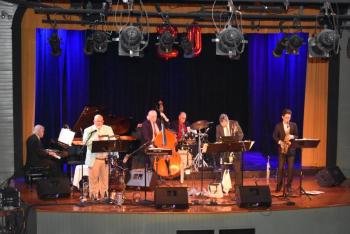 Barney Balch and Novel Jazz. LISA KRISTOFF/Boothbay Register
Barney Balch and Novel Jazz. LISA KRISTOFF/Boothbay Register
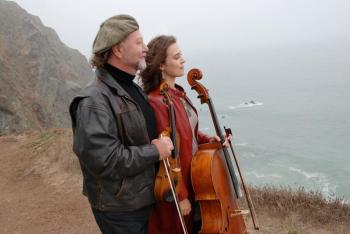 Alasdair Fraser and Natalie Haas. Courtesy of the Opera House
Alasdair Fraser and Natalie Haas. Courtesy of the Opera House
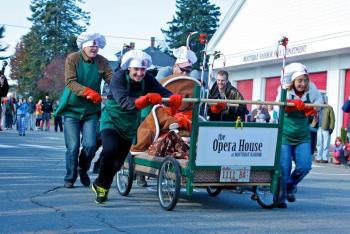 The Bed Races of 2012. Hold on Ginger! Courtesy photo
The Bed Races of 2012. Hold on Ginger! Courtesy photo
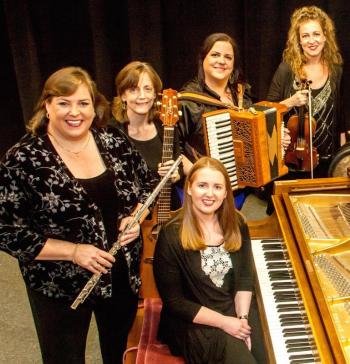 Cherish the Ladies. Courtesy of the Opera House
Cherish the Ladies. Courtesy of the Opera House
 Danny Beal. File photo
Danny Beal. File photo
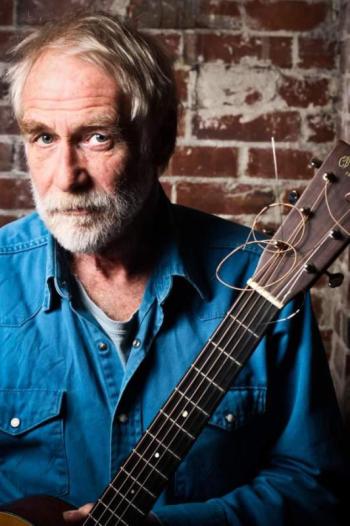 Dave Mallett. Courtesy of the Opera House
Dave Mallett. Courtesy of the Opera House
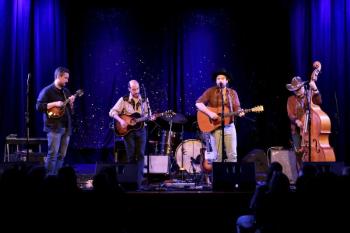 Gabe Tonon and Friends. Courtesy of the Opera House
Gabe Tonon and Friends. Courtesy of the Opera House
 Garrison Keillor. Robert Mitchell photo
Garrison Keillor. Robert Mitchell photo
 Hot Tuna 2014: Jack Cassady, Jorma Kaukonen with mandolinist Barry Mitterhoff. File photo
Hot Tuna 2014: Jack Cassady, Jorma Kaukonen with mandolinist Barry Mitterhoff. File photo
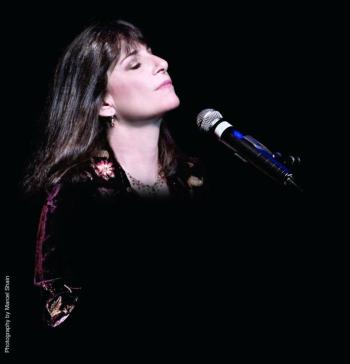 Karla Bonoff. Courtesy of the Opera House at Boothbay Harbor
Karla Bonoff. Courtesy of the Opera House at Boothbay Harbor
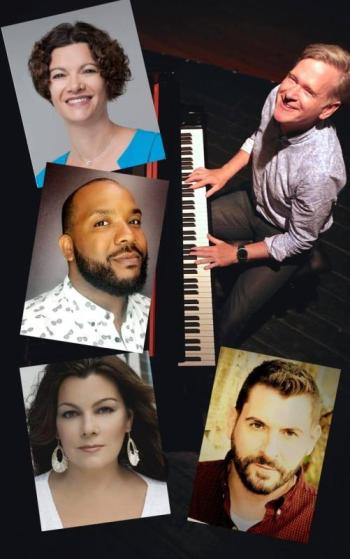 Kevin Kiley and Friends show poster. Courtesy of the Opera House at Boothbay Harbor
Kevin Kiley and Friends show poster. Courtesy of the Opera House at Boothbay Harbor
 Livingston Taylor. Courtesy of the Opera House at Boothbay Harbor
Livingston Taylor. Courtesy of the Opera House at Boothbay Harbor
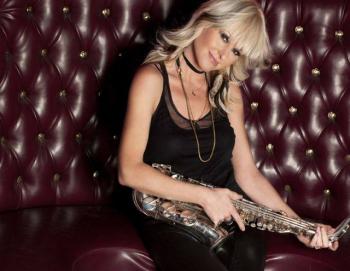 Mindy Abair. Courtesy of the Opera House at Boothbay Harbor
Mindy Abair. Courtesy of the Opera House at Boothbay Harbor
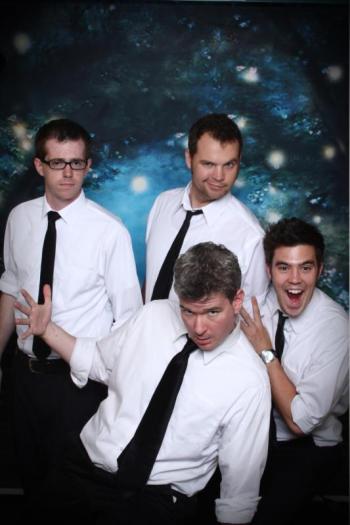 Mission Improvable comedy troupe from Chicago. Courtesy of the Opera House at Boothbay Harbor
Mission Improvable comedy troupe from Chicago. Courtesy of the Opera House at Boothbay Harbor
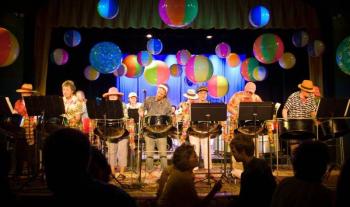 Pan Fried Steel’s annual spring show, decor by Kevin Kiley. Courtesy of the Opera House at Boothbay Harbor
Pan Fried Steel’s annual spring show, decor by Kevin Kiley. Courtesy of the Opera House at Boothbay Harbor
 Peppino D’Agostino. Courtesy of the Opera House at Boothbay Harbor
Peppino D’Agostino. Courtesy of the Opera House at Boothbay Harbor
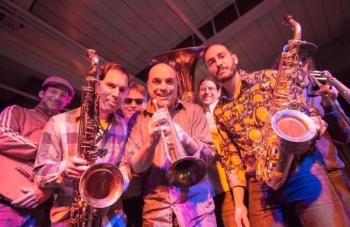 Raging Brass. Courtesy of the Opera House at Boothbay Harbor
Raging Brass. Courtesy of the Opera House at Boothbay Harbor
 Ray Benson. Robert Mitchell photo
Ray Benson. Robert Mitchell photo
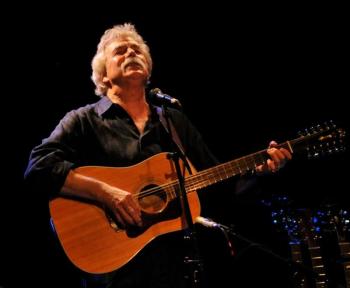 Tom Rush. Courtesy of the Opera House at Boothbay Harbor
Tom Rush. Courtesy of the Opera House at Boothbay Harbor
 File photo
File photo
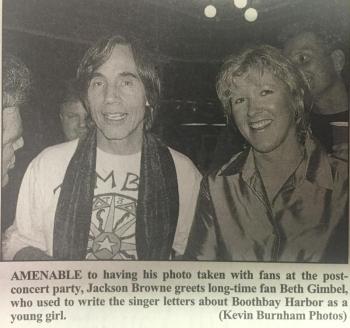 Beth Gimbel with Jackson Browne, 2003. File photo
Beth Gimbel with Jackson Browne, 2003. File photo
 Ticket buyers for Jackson Browne 2003. A couple from Wells were first in line. File photo
Ticket buyers for Jackson Browne 2003. A couple from Wells were first in line. File photo
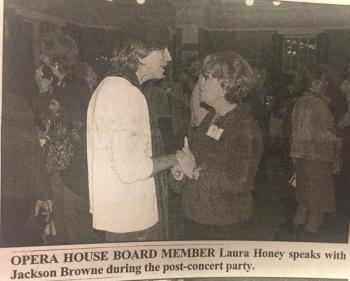 Opera House board member Laura Honey and Jackson Browne. File photo
Opera House board member Laura Honey and Jackson Browne. File photo
 The U.S. Army Jazz Ambassadors. Courtesy of the Opera House at Boothbay Harbor
The U.S. Army Jazz Ambassadors. Courtesy of the Opera House at Boothbay Harbor
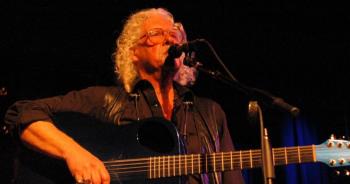 Arlo Guthrie, 2014. Ellie Busby photo
Arlo Guthrie, 2014. Ellie Busby photo
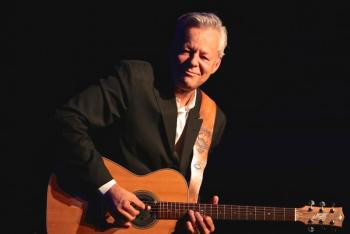 Tommy Emmanuel. Courtesy of the Opera House
Tommy Emmanuel. Courtesy of the Opera House
 U.S. Army Jazz Ambassadors. Courtesy of the Opera House
U.S. Army Jazz Ambassadors. Courtesy of the Opera House
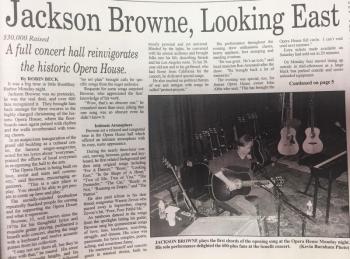 Boothbay Register files
Boothbay Register files
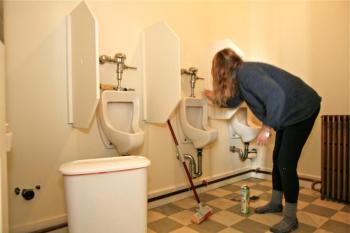 Volunteer Susan Endicott. Courtesy of the Opera House
Volunteer Susan Endicott. Courtesy of the Opera House
 Courtesy of the Opera House at Boothbay Harbor website
Courtesy of the Opera House at Boothbay Harbor website
 Caribbean Night set up for 50 in July 2020. File photo
Caribbean Night set up for 50 in July 2020. File photo
 Chris Thomas King. Peter Southwick photo
Chris Thomas King. Peter Southwick photo
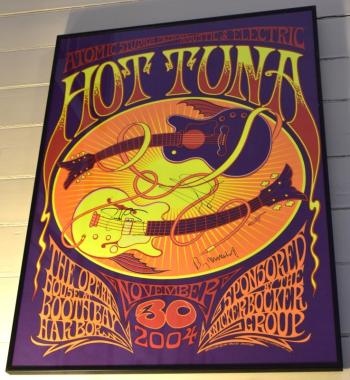 2004 Hot Tuna poster by Atomic Studios. File photo
2004 Hot Tuna poster by Atomic Studios. File photo
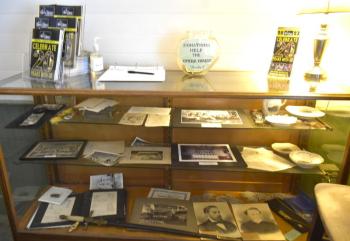 Historic display case. LISA KRISTOFF/Boothbay Register
Historic display case. LISA KRISTOFF/Boothbay Register
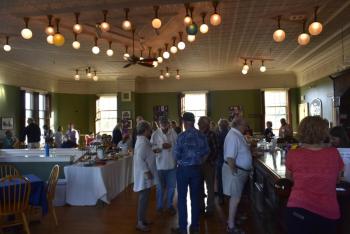 The historic bar was the scene of a recent event held to honor volunteers and members. LISA KRISTOFF/Boothbay Register
The historic bar was the scene of a recent event held to honor volunteers and members. LISA KRISTOFF/Boothbay Register
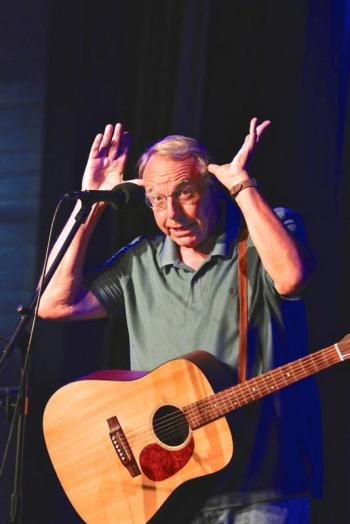 Tim Sample. Courtesy of the Opera House
Tim Sample. Courtesy of the Opera House
 View from stage right. Opera House FB page
View from stage right. Opera House FB page
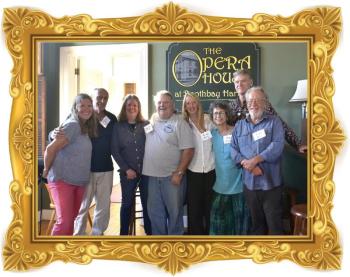 Longtime stewards, from left: Cathy Sherrill, Mike Marr, Susan Brackett, Mark Stover, Susan Endicott, Jill Tupper, Kevin Kiley and Tony Heyl. LISA KRISTOFF/Boothbay Register
Longtime stewards, from left: Cathy Sherrill, Mike Marr, Susan Brackett, Mark Stover, Susan Endicott, Jill Tupper, Kevin Kiley and Tony Heyl. LISA KRISTOFF/Boothbay Register
It has been a year of celebration at The Opera House at Boothbay Harbor. Twenty years ago on Sept. 29, 2003, the nonprofit of the same name purchased the 1894 building for $1.2 million from John and Sarah Abbe. Almost half of that price was raised through contributions, and the balance financed through Gardiner Savings Bank. Four of the officers at the signing were Steve Malcom, Tony Heyl, Joyce Armendaris and Dr. John Andrews. Since then, the 65-foot, three-story Queen Anne-style building has become an internationally known performance space.
“It seemed like the natural thing to do,” said Malcom, who served on the board for 12 years. “The rumor was it was going to be torn down and become a parking lot. For us it was about saving the opera house – and doing whatever it took to do that. It was an important part of Maine history that had to be preserved.”
Said Heyl, first board president, “From an economic development standpoint, the Opera House would be this vibrant venue on the north end of town. But in the beginning our true passion was to save the iconic building from (the rumored) fate of being torn down. It’s another testament about the people of the Region banding together. And, thanks to Bob Jones, and a few others, we were able to save it. You could write volumes about the early years, which were a struggle – but with lots of humorous events.”
Entrepreneur Jones loaned the group $400,000 toward the loan and $100,000 cash for expenses to be repaid in three years.
Fortune smiled on the group in 2003 when Save the Opera House group members Richard and Kristina Ford, then residents of East Boothbay, asked their friend Jackson Browne if he would perform a benefit concert for Boothbay Harbor’s Opera House. That concert, the first to rock the saved House, happened on Nov. 3. Malcom and the new Opera House board had three weeks to gut the inside of the historic structure, which still housed the small shops of its former incarnation, and bring back the original performance hall.
“Yeah, I was a bit freaked out,” said Malcom. “All (of) a sudden it all became real. Talking to people, gathering support. Thanks to Bob Jones, financially things were starting to gel, and then the opportunity for Jackson Browne to play here came. I said we gotta roll up our sleeves and make it happen. It was a great testament to the reputation people here have of pulling together – and this time, it was the trades people.”
The first executive director of this new era was Stephen Coppick, who began his two-year run in March 2004. Coppick had an extensive background in the arts as producer of plays and concerts, executive director of other creative venues, and in marketing. Said Malcom, “Steve was great. Here he was surrounded by people with very little or no experience. He had a tough hill to climb with a board trying to get its act together and a community questioning ‘What are these people doing?’”
Said Coppick, “At that time there were no chairs and no lighting. We bought some folding chairs and rented lights for almost two years. Brian Hapcic (a professor of lighting and sound design) who was at (UMaine) at the time said we needed a control booth and control panel, and knew where we could get some funding. With his help I was able to write a grant for both. And there was no sprinkler system, which ended up being a huge project.”
Coppick booked many bands, including Room Full of Blues, Rory Block, Pete Best Band, Little Feat, and Buckwheat Zydeco. Recalled Coppick of the Louisiana musician, “I didn’t know how he would go over, but we sold out – 600 people – and he rocked all night. We had to borrow more chairs from every church in town and other places. Here’s an interesting thing: Buckwheat met Brud (the Hot Dog King) on the street and they got to talking and he invited Brud to come to the show and play his spoons. It was a great local moment. I really loved that.
“I had long talks with Bob (Jones) about kids programming and about making the Opera House the center of the community.” Coppick said. “The kids are a great memory for me. I remember Steve’s (Malcom) sons, Robo Bishop, Soren Barker ... so many others. It was so much fun watching them experience the music, the plays, and the classes. I remember Tiffany Bacewicz and the series of children’s shows that first summer. The House had been there so long and meant something different to every generation. Here was a new generation making theirs and that was fun for me. And I remember feeling a sense of stewardship.”
Another memory of Coppick’s was being on the Opera House roof during an intense rainstorm with high winds a few months before his departure. “The storm had knocked off the cupola exposing the roof to damage,” he said. “I can still see myself on the roof in that raging storm at 1 in the morning with a staple gun and plastic, desperately trying to cover the space … and feeling like Ahab.”
Cathy Sherrill has been the Opera House’s executive director since 2006, following the departure of Kate Schrock, program director for less than a year, after Coppick moved on. That year, a $1 million fundraising challenge was set to pay off the bank loan. Malcom asked Sherrill to help. Sherrill had an arts background in TV and film production and had plenty of experience booking entertainment at venues. And she had led fundraising efforts at Coastal Maine Botanical Gardens one year (2002-2003) as a part-time development director and interim director.
“I said, ‘Sure I can help.’ I thought it would be for a few months. This was the perfect job. Who would have thought you could leave a career and yet find the perfect new career? Who would have thought all these years later, I’d still be here?” said Sherrill, 17 years later.
She recalled the Mark Knopfler concert, the one that drew people from around the world to Boothbay Harbor’s Opera House. “I was taking ticket orders from Germany, Switzerland, the UK, Canada. I had no idea how big Knopfler would be. The first two days tickets were only sold in person and then we opened up phone sales. It wasn’t that I didn’t know him, it just never occurred to me that people would fly from Switzerland to come to a concert in Maine.”
But come they did and the former Dire Straits frontman and band played to a sold out concert of 600 people that raised over $200,000. “We had to raise $500,000 to match a grant. It really upped the exposure. On the deadline day that September we made the challenge with 17 hours to spare. We paid off the mortgage,” said Sherrill. “Without the 2003 and 2013 Jackson Browne shows and Knopfler in 2006 the Opera House finances would have been very different and I doubt it would have survived in this format. It might have been sold or something else would have happened – despite the enthusiasm.”
Sherrill noted these key volunteers over the years: Susan Brackett (wearing every hat imaginable), Susan Endicott, Robert Mitchell (frequent house photographer), Rick and Pandy Dickinson (Pandy heads up Friends of the Opera House), Paul and Louise Cowan, Jean Rosenberg and Peter Southwick, Wendy and Al Bellows, Michael Marr (volunteers design services for membership brochures and rack cards – over 10 years), Steve Malcom and Martha Barrett, Garry Blackman (organizer of Hometown Hootenanny fundraiser for 10 years), Bonnie Ginger and Irene Fowle – over a decade as chief gardeners, Mark Stover (load in crew, board member, and boat tour guide for bands), Tony Heyl (early days inspiration), Jill Tupper (multiple stints on the board, including president; usher, and was attorney for the Opera House at Boothbay Harbor).
The Friends of the Opera House play a pivotal role in fundraising. From baking the sweets sold during shows to the replacement of the oval window with one of stained glass designed and made by stained glass master Dick Macdonald; to making food for the performers and events including Dough Balls and Gingerbread Spectaculars.
“All the personalities who have been here have shaped what the Opera House is today,” said Sherrill. “It needed every volunteer along the way, the staff members, and boards. All of these volunteers, and dozens more, have been essential to the success of the Opera House for years. And every year we have new volunteers who join in to help make the season run smoothly.”
“Star” volunteers during Sherrill’s early years were given something rather unusual: The Pammy Award, which Sherrill said was their version of a Grammy. “Susan Endicott has a manequin head named Pam that was the inspiration for the Pammy. In those early days with me, Susan would ask acts like Gaelic Storm to take a picture with Pam. And they did! And so did others!” Sherrill said laughing. “I’m there were wondering, ‘Who are these people? Here I am trying to raise money for this place and there are people here carrying this head around! It’s like Lord of the Flies or something (just not a pig’s head).’ But, I thought, no, don’t rock the boat... Now I’m the one going to the thrift stores looking for baby doll heads to dismember, put on sticks, and spray paint gold in the front yard. Once in a while people would be walking by and ask what I was doing … I would just mumble “It’s a surprise ...”
Sherrill believes there are still some potential Pammy Award-worthy recipients out there, but “At that time it was an honor to receive a Pammy Award, but I fear the times have changed and people wouldn’t feel as honored to receive a spray-painted doll head.”
Fast forward to the second decade of the save. In the best of times, said Sherrill, tickets covered performances with a little left over to cover staff salaries and heating and electricity. The rest was covered by sponsorships, memberships and contributions. When COVID-19 arrived in 2020, the best of times seemed to be at a possible end.
“We closed earlier than most places,” said Sherrill. “It was irresponsible to stay open. I couldn’t expose our volunteers and the public to whatever this virus was. We were three months dark and then in July only 50 people could be in the space. It was important to keep the Opera House functioning in some form, but touring artists still couldn’t get visas. When we (opened) it was because we put Maine-based musicians on stage. Still, I couldn’t help thinking, ‘Will we ever get it back? Will anyone come?’ COVID changed audience behavior.”
Sherrill noted the community stepped up before being asked. “People started to call or I’d run into people at the post office asking what was needed. One individual said ‘Don’t worry, Cathy, we won’t let (the Opera House) fall.’ So, much like the early days with Jackson Browne and Mark Knopfler, it was the community that came through during the ‘COVID moment.’”
The years 2020 and 2021 were quite a challenge, but when 2022 rolled around the Opera House was on a definite upswing, and audiences were coming back out. People longing for some semblance of normality returned for live music, magic shows, comedians and comedy troupes. “I’ve booked well over 1,000 shows, and that includes returning performers,” said Sherrill. “But it doesn’t include what Steve (Coppick) and Kate (Schrock) booked. I think it’s more than fair to say there have been 1,500 shows in the last 20 years, not including community events.”
And, as has been true throughout its history, the Opera House has hosted proms, school concerts, political forums, art shows, Santa and Mrs. Claus during Harbor Lights Festivals, the annual Boothbay Region Garden Club’s Festival of Trees, fundraisers, celebrations of life, local businesses’ Christmas parties; the annual Hootenanny; Halloween Scary Readings & Potluck, Gingerbread construction workshops led by Kevin Kiley and his mom, Pat Kiley, before him; the Gingerbread Spectacular, Dough Balls, Christmas sing-a-longs, and more.
Special events have had the incredible atmosphere designed and executed by Kiley, the Opera House’s technical director who also helps performers set up. An accomplished musician, dancer and actor, Kiley has an imagination and attention to detail that transforms the old House into the stunning, holiday-enhancing experience it is year after year.
“It’s sort of an immersive experience (due to the décor),” Kiley said. “I shoot for someone saying ‘How did you think of this’ or ‘There’s so much detail.’ People have said (the special decor is) like (in) New York. I could just do wreaths and a tree, but there should be some emotional experience going with it. In the beginning I used a lot of found objects in the Opera House and at yard sales. Steve would give me some money, and Cathy always has, to work with.”
Sherrill, said Kiley, has always been a forward motion for the Opera House, able to solve problems and book acts people want to see. Kiley recalled Coppick starting the cabaret in the bar. That is when he started performing with his friends, now an annual concert event.
What he loves most are the people – audience members and performers – and being in the Opera House alone. “The building is special. There was a period when I’d spend a lot of time playing the piano. I love playing when no one is here.”
For former board president, president emeritus, and volunteer Susan Brackett has always found the Opera House to be a magical place of peace and joy. “The old house holds on to the magic that’s happened within its walls through the years,” Brackett said. “Cathy only brings the best of the best. Even though the act may not always be famous or on an individual’s (favorites) list, audiences can always trust Cathy’s judgment.”
A recounting of the past 20 years at the Opera House would not be complete without a few ghostly tales:
Abbe owned the Opera House from 1986 to 2003 and experienced supernatural moments aplenty that began before he bought it. “The Opera House actually found me. But I didn’t realize it ’til after I owned it. Isaac Abbott was head builder when the Opera House was being constructed and later its maintenance guy. Abbott was buried on his property that I bought on Barter’s Island before I’d even thought of buying the Opera House. I had just cleaned up the area around his plot shortly before I decided to go look at it. The way I see it is, he found me: 100%.”
Abbe remembered the building being “in pretty rough shape after being used as a flop house for years.” He vividly recalled the day he went to look at it with a realtor. “We’re in the mezzanine and we hear the piano playing upstairs. I said ‘Is someone else here? Someone has to be pedaling for that to work.’ The two of us walk over to the piano and it was covered with dust. Then the realtor said the supernatural ghost came free with the building. I put an offer in with a cash advance to hold the contract and bought the building and the parking lot next door for $200,000. Like I said, the building found me.”
Malcom was bartending one night when the ice scooper flew out from the ice machine room behind the bar. He figured someone was inside it pulling a practical joke, but no one was there. He put the scooper back and went back to the bar. A few seconds later, it flew out again. And, “One night I was signing appeal letters in the bar when the piano started playing. Then it stopped. I thought, that’s weird and went back to the letters. But when it started playing a second time, I dropped my pen and was down the stairs like a shot and out of the building!”
Coppick recalled inviting the cast of a play to his house for drinks after a show. He was locking up when an audience member asked to speak with him. “I was kind of rushing locking the doors because I had invited people over, but I relaxed when I heard John (a cast member) playing the piano and the others singing around it. So we stood there talking about fundraising for quite a while in the stairwell. We finished up and I locked the door behind her. At the same time the music had stopped and I went into the theater to see everyone – but it was dark. I thought that was weird because I had just called out to them that I was finishing up. I went to my place and asked them why they didn’t wait for me ’cause I was just about to leave. They said ‘What are you talking about, we’ve been here (waiting) for 40 minutes.’”
The Opera House at Boothbay Harbor was the April image in the 2014 Haunted New England calendar created by paranormal researcher Jeff Belanger (“Ghost Hunters” and Travel Channel) and photographer Frank Grace. The pair had visited the Opera House in 2013.
“This place matters. Who knew that four walls could? We have a really nice balance, I think, of community events and nationally and internationally known acts,” said Sherrill. “(The Opera House) brings the world to Boothbay Harbor and to Maine. Even musicians who come for the very first time will tell me they heard about the Opera House because ‘Mark Knopfler did a concert in some funny little place in Maine.’ It’s become legendary among musicians that Knopfler came, and it was his playing here that has allowed us to contract, to hire people, who would never have looked at a place with no track record.
“We need to do everything we can to keep the doors open,” Sherrill said. “This season it’s like COVID didn’t happen. But, there is always angst; it never goes away. You’re throwing a party and you ask, ‘Will anybody come?’”




















































































